#like there is this extreme disconnect between the narrative and the actions she has her characters take
Explore tagged Tumblr posts
Text
I don't feel like people have a nuanced enough view of Kory what she thinks about killing. She's not blindly wanting to murder criminals, nor is she delighted by the actions of murder. She sees murder as a necessity because of her upbringing in the middle of an existential war, and also as a way to regain autonomy on her life. Autonomy is a key theme in many of the people Kory chooses to kill.
The idea of autonomy over the body and her life is extremely important to Kory. This makes sense, Kory spends six years in slavery, her life not her own, and grew up knowing her planet could lose its own autonomy and freedom at any time.
When she was a slave, the few times that she was able to control her life in those times. Her first kill was her kill of what would become her last master, starting the chain of domino that would result in her freedom.

Note her words: "His very touch sickened me". It wasn't just about her imprisonment or her anger, but about her body, her autonomy. She couldn't handle being touched like that anymore, and killed knowing that it would solve nothing, knowing that it would lead to more punishment for her later down the line.
Her next kill allowed her to escape, securing her freedom and her own autonomy.

To escape she must pretend Kory has completely given in to her captors. That she is fine, even happy with the Gordonian touching her. But by doing this she is bringing him close, giving him the illusion of control over herself to secure her own freedom.
She is pretending to be a slave, while affirming to herself that she is still a soldier.
In this way we can see a dichotomy that has ruled Kory's life until now. On one side, you have succumbing to subjugation, which involved a loss of bodily autonomy. On the other side you had her claiming her freedom and her autonomy which comes with the need to kill or be destroyed.
In addition to this, you need to think of the context of Kory's upbringing. Of course Kory is used to killing her enemies. She grew up in a climate of fear in which there was a real possibility of total annihilation. Millions of her people died in the war that eventually lead her to being sold as a slave.

She grew up during a society that could have been destroyed in war, where everyday killing was not a questions but an existential threat. Killing and war was literally the only way for her people to conserve their autonomy.
This disconnect between Dick/Donna and Kory is not because Kory is an alien, but because the Titans are living in a world where they are superheroes and Kory is living in a world where she is a solider. Would a Kory that didn't kill even been able to come out alive from war? From her enslavement? To her its about her autonomy and her independence, she doesn't have the luxury of morals, of thought, of choice.
Later we see Kory not change, but shift. She realizes that killing will never be easier for her again.
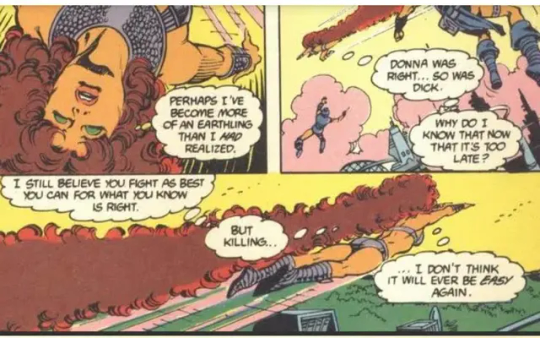
This makes sense! her interpretation of killing has changed a lot because she's been exposed to a new environment. On earth she is not facing a literal war, she has real power, she has backup, she doesn't have to fight every second for her freedom and autonomy.
I think this is demonstrated in an incredibly narrative compelling way in Titans (1999) when Kory kills to give another character autonomy over her own body; Adaline Kane. Adaline is about to die, but her blood can still be harvested for Vandal Savage's experiments. She begs for death, instead of living that fate.


Kory gives it to her.
(much like Slade gave Joey in Titans Hunt but this post only has the space for one parallel right now)
When it comes to protecting the greater good, and especially when it comes to bodily autonomy Kory is not only willing to kill, but sees it as her duty.

She's never stopped being a soldier, she's never stopped being the Tamaranian who was forced to kill and see her people die to preserve her home, but more than that, she never stopped being the little girl for whom killing was her only way of reclaiming her autonomy.
#wish we could have nuanced discussions about perpectives of characters on killing but this is the j8son t0dd website so everyones#all like murdering random criminals is good/bad n thats all we get#kory#koriandr#kory anders#starfire#dc meta#meta#titans#teen titans#starfire meta
255 notes
·
View notes
Text
Where sjm fucked up was deciding her books feature dynamics that should be praised for being real life goals or narratively try to convince the audience the characters she likes are all pinnacles of true goodness and anyone against them is purely evil.
#like I know y’all are very character hate oriented and I am too#but also none of what she wrote would actually bother me THAT MUCH if she didn’t pretend it was something it absolutely isn’t#these books don’t at all feature well rounded discussions of morality#they are so fucking black and white and biased towards whoever is her favorite atm but has nothing to do with what the characters actually—#do#like there is this extreme disconnect between the narrative and the actions she has her characters take#and again that WOULDNT BE A PROBLEM IF SHE JUST OWNED THAT#and her fans acknowledged it#but they fucking dont which is like are y’all fucking stupid ? do you not know how to critically read?
1 note
·
View note
Note
I think the way Eve and Ally are treated by the narrative is weird.
Out of character, Kc has called both of their behaviors unreasonable. i forget the exact wording but kit said something about them being non-perfect and extremely flawed, that they weren’t necessarily wholly good as people. She seems to accept that their behavior is concerning, yet when writing the comic neither of them are given any kind of punishment. No one is ever called out (except Barry telling Eve to be nice like once i think??), nobody ever thinks back on their actions and tries to change, and with the recent development that “actually Sly is totally fine with Eve bullying her!!!” It feels like theres some weird disconnect between what Kc says and what she shows us in canon.
Sorry if this doesnt make sense or is a stupid thought
- 🃏
Don't worry, it makes sense! And I completely agree.
Kc says that they are flawed people, and that they're not perfect. Which they aren't! And I feel like the fact that they're never called out for their actions could make an interesting character arc. Such as Sly finally getting tired of the way Eve treats fen and blowing up on squeak instead of staying silent forever. Or Howie telling Ally that kits anger issues are an issue and stresses him out. But nope
Kc TELLS us that Ally and Eve are flawed characters, but we don't see that. There's no conflict. Everyone bends to their will, and while again; that would be interesting for a character arc, it's painted so that Eve and Ally are always in the right. "Ally gets angry when people say aliens aren't real because of kits autism!" Is a perfectly fine way to explain why she acts like that, but it is not an excuse for her to throw such giant tantrums that put others in literal danger.
I said this before on another blog, but using your mental disorders or neurodivergence as a shield to deflect people's problems with how you behave is ignorant and childish. While it can explain why you do something, if your actions hurt others around you (mentally or physically, both are terrible) then you need to change said actions. Even if your brain is wired differently, that is not an excuse to hurt others around you.
The fact that Kc is completely ignoring all of Sly's trauma and past thoughts and actions (take her toyhouse, for example) and retconning it to be that Sly is completely fine with everything Eve does and finds it FUNNY is terrible writing at best, and sticking up the middle finger to every family trauma victim that spoke up about it. The fact that buns hides Ally behind a shield of her autism is also upsetting; autistic or neurodivergent people do not get a free pass to hurt others just because of their neurodivergence. And just because Eve has been traumatized in the past does not give her an excuse to traumatize others, and that's coming from someone who rewrote Cuddles to act that way! It doesn't excuse her actions, because squeak is continuing the cycle of trauma and Kc is glorifying it.
#answers#sparklecare criticism#sparklecarecriticism#sparklecriticism#sparklecare discussion#This is my first crit post in a while did I cook or burn the dinner
11 notes
·
View notes
Note
What are some similarities between you and your muse/muses? What are some differences between you and your muse/muses?
Are there certain characters that you gravitate towards?
Favourite trope? Least favourite trope?
MUNDAY QUESTIONAIRE. || ACCEPTING
8. What are some similarities between you and your muse/muses?
Oh! This is a fun one! Now, by and large, I've found one of the uniting traits across the spectrum of the characters I play is loyalty - I don't play many, if any, characters that don't have that firm resolution towards the people they choose and the causes they champion. Sometimes this is a positive thing; other times, well, see Evan and Sally. But it's a trait that all goes back to me!
Likewise! Many of my characters veer between levels of empathy and have complex relationships with their empathy. Now it's an odd similarity, I'll admit, but as a neurodivergent person, I've always seen the subject of it to be interesting. Like, it's not something I was just unconsciously aware of since birth; it's something I've always had to look into and keep checked in order to mask better! That way I never go too far into any extreme haves and have-nots. So, with this in mind, I love to play around and explore characters in that same vein! Having characters unaware of their relationship with their sense of empathy and seeing how it impacts them and their interpersonal relationships!
For instance, with Leshy, he has very, very low empathy due to his megalomania from being a god, how long he's been isolated and away from human contact and the disconnection that's formed between him, his actions and his mind. This, expectedly, has caused his relationships with other beings, such as Fiadh and the other Scrybes to become extremely fraught!
Now, I should state for the record, that at the best of times, I find myself struggling with empathy more on the overly empathetic side of the equation, so, more accurately, you could compare me as a mun to either Ophelia or Sally in that regard. In fact, of all of my characters, I am the most similar in terms of personality to Ophelia. However, that is kinda by design as she started out as a venting character used to express my own fears, but kind of evolved into her own thing! But moving on!
9. What are some differences between you and your muse/muses?
First things first! I don't kill or hurt people, so that's one HUUUUGE difference between many of my muses and myself! Haha. To be more specific, though, I make all of my characters more confident and headstrong than I make myself. Often this becomes a flaw for said character; see Sally, but even still, they are more assertive than I could ever be!
Additionally, their OUTLOOKS, oh my god, I will say, not one of the characters even begins to touch on the outlook of a bun and to say there are similarities between the two would be to say that Nunavut and Florida are similar just because they're both in the Northern Hemisphere. My character's outlooks are a disaster zone of hopelessness, delusion, ego & toxicity. And while it's super fun to watch them, I would NOT want to be inside their minds!
21. Are there certain characters that you gravitate towards?
Hands down, tragic characters, I LOVE miserable, tragic and terrible people! Haha. Perhaps my decision to choose these characters is due to my internal desire to do better by them and give them things to explain their misery and make them less pitiable! Or maybe I just like the sadness and anger in their narratives! Who knows!
16 & 17. Favorite trope? Least favorite trope?
Pointless struggle. I always really hate the narrative in horror media that spirits and monsters perpetuate this cycle of anguish for themselves and others, just for some person off the street to come in and teach them the meaning of friendship or w/e and boom! Everyone is happy! The evil is defeated! It always feels so cheap and, to me, undermines the core message of the spirits and monsters (especially when they relate to topics like abuse). That being said, when this trope is flipped on its head, and the actions of outsiders intruding in on these cycles with the hopes to fix things aren't rewarded and the narrative makes sure to outline that no one has benefitted at all and, in fact, the intruders have just fed into the cycle, making the agony more intense. I don't know, it feels a lot more poignant as a whole and I like it a lot better!
5 notes
·
View notes
Text
Understanding Kara no Kyoukai 7: Themes of Identity, Morality, and Resolution

Kara no Kyoukai’s 7th installment might just be the pinnacle of the series, exemplifying everything it aims to achieve. It’s trippy, surreal, and offers a remarkable conclusion to Shiki and Mikiya’s arcs. Throughout the series, Shiki has been gradually revealed as an unstable character, disconnected from the world due to her upbringing with dual personalities. Her connection to the world is rekindled through Mikiya, who provides her with a sense of purpose and stability. In this film, Shiki strays further from normalcy than ever before as her second personality takes on a tangible human form, forcing her to confront her feelings about herself, the world, and Mikiya.
Before diving into the film’s core, it’s worth noting the stunning artwork featured in the opening credits. The eerie, almost mystical visual style, combined with one of Yuki Kajiura’s hauntingly beautiful vocal tracks, creates an incredibly captivating scene. The song particularly stands out, as it seems to reach into a void, seeking hope amid deep despair—a reflection of Shiki’s struggle to find her place and her darkest moments in the film.
Mikiya’s strong aversion to death and murder, along with his willingness to sacrifice himself for others, is put to the test as Shiki embarks on a path to kill Lio Shirazumi, her split personality. She aims to eliminate the part of herself that has caused her so much suffering, but in doing so, she risks erasing a significant part of her identity. Shiki grapples with this dilemma, and as someone who is already unstable, she hesitates to make a decision that could fundamentally alter her sense of self. Mikiya, on the other hand, struggles to understand this conflict and believes that Shiki should never seek to kill anyone, even someone as malevolent as Lio.
Mikiya’s insistence that he would never forgive Shiki if she kills Shirazumi Lio drives a wedge between them, emotionally separating them for much of the film. Nonetheless, it becomes clear that Shiki must eventually confront Lio, as he represents a part of her she can no longer accept. Mikiya must come to terms with the fact that he can’t always be right or prevail. Although he hoped that Shirazumi could be saved, he ultimately realizes that Lio was merely a manifestation of the darkest, most primal aspects of the psyche, with no place in the world.
The film’s exploration of whether killing is moral and how it affects one’s humanity might seem broad, but I view it more as a metaphor for self-realization and acceptance. The moral complexities are secondary to the themes of how we handle our actions and decisions. Shiki doesn’t view death as problematic if she’s the one deciding the outcome. Despite her outward calm, she is extremely stubborn and decisive. Mikiya’s contrasting morality adds depth to their dynamic, creating a compelling contrast of light and dark.
Shirazumi Lio is a compelling character, particularly in relation to Shiki. His wicked confidence and power force Shiki and Mikiya to reassess their own beliefs. He is central to the overarching narrative of Kara no Kyoukai and has been a crucial element throughout the series.

Visually, this installment stands out as a masterpiece. It’s the best directed and most visually striking film in the series, feeling the most like modern Ufotable work. While Mujun Rasen was notable for its insane plot and mind-bending visuals, this film feels the most emotionally resonant and heartfelt. Each location, from Shiki’s empty apartment to Touko’s cluttered office, is unforgettable. The aesthetic and directorial style are qualities I aspire to incorporate into my own future projects.
Ultimately, Kara no Kyoukai explores the contrasts of life and how opposing forces complement each other. To me, it represents a love story in its most abstract form—defined by characters who, despite their stark differences, help each other understand and define themselves. The series conveys that understanding oneself and finding happiness often comes through accepting and reconciling these contrasts.
In conclusion, Kara no Kyoukai is a series I hold dear and look forward to revisiting for years to come. It’s a story that resonates with me deeply, influencing how I perceive myself and the world. This morally driven storytelling continues to captivate me, and I’m eager to see how it will inspire my own storytelling in the future.
0 notes
Note
Just remembered that I can use cuts to keep posts from getting this long, lol
@autisticandroids :
i mean i don't think that's meant to be read as dean being mean to people who care about him. i think it's meant to read as cas having been previously evil, and now being insufficiently penitent [because he is selfishly disconnecting from reality instead of doing his job]. like that's the difference between gamble's honey cas and edlund's. edlund portrays honey cas as the only rational reaction to such a horrific scale of crime, and understands that what cas did in mtnb was primarily a crime against angels. gamble thinks that honey cas is a cowardly abdication of responsibility, and thinks of his crime in mtnb as against dean primarily, not other angels. so according to gamble, cas didn't just betray dean, now he's being a selfish coward and not making up for his actions. Like it's not that gamble thinks that we want to see dean be cruel. it's that she thinks we want to see cas punished as he deserves for his behavior. Like dean isn't even really acting as dean, there. he's acting as authorial voice. a lot of dean's extreme cruelty is a result of this: someone, usually sam or cas, does something deemed unacceptable, and narratively they have to be punished, so dean does it i guess. i feel like it's legit to just 100%discount those moments in terms of characterization because they're literally dean acting as voice of the narrative, but they do happen and imo cursed or not is one of them
To my understanding Edlund and Gamble worked together closely to develop the season, and I wouldn't expect them to have significant philosophical differences on it. I think the difference between them is that their episodes served different functions, Edlund is just more interested in Cas and the angels, and that Edlund was more interested in doing interesting things with ambiguous TV disorder.
And I don’t think Gamble thinks we want to see Cas punished. She knew that fans wanted Cas back, she wrote 7x17, she wrote the trenchcoat scene. That was Gamble demonstrating her understanding of what the audience wanted. She's made jokes in episode commentary or something about how the emotional scenes are about pretty men staring at each other, or something to that effect. I think her approach to the "I'd rather have you" scene can be determined from those things. It's a sincere, straightforward reconciliation that's meant to satisfy the broadest possible layer of viewers, including the casgirls who had been harassing the network for months.
It doesn't make sense to say that Gamble doesn't think Cas is sufficiently penitent. Again, she wrote 7x17, she wrote Cas saying "I deserved to die". That's pretty sufficient imo. The whole point of Cas' madness *is* that that’s his penance. The point of it is that he fucked Sam up and then he paid for it by being TV-crazy. As a writer, I don’t think it makes sense to be like, okay we'll punish Cas this way because if there's one thing he can't get off scott-free from narratively it's hurting Sam, and then we'll punish Cas for being punished.
And I also doubt that Gamble has strong feelings about Cas and his blame worthiness in general. Like she got rid of him not because she has a problem with him afaik, but because she wanted to take the show "back to basics", which tbh was not an unreasonable idea in the abstract.
The main reason why I'm responding so strongly to this is that I think the idea that we're meant to laugh at Cas in that scene is, frankly, out of left-field and objectively untrue. (And yeah it frames Dean and Cas' relationship in a way that gives me war flashbacks to s7 tumblr). If that was the goal then it utterly failed because literally no one saw it that way, not even the people who insisted that Dean just wanted to use Cas. But everything about the narrative function of the scene, the conventions of the show, and the way the scene is played indicate that it's meant to be sincere.
Not only is Cas + Dean + honey unfluffy, it can be downright angsty. I think that Dean, like fandom, could latch onto this one known interest Cas has, and while he'd hate being reminded of Honey Cas he'd totally try to "bribe" Cas with bee-related gifts. Dean is always interested in things that make Cas more reachable, touchable, and human. Cas, who may not even remember what happened when he was dealing with Sam's Hell memories, could easily think Dean is just taking him to a beeswax candle store because Dean likes doing human things together. It would be deliciously hurtful and unsustainable--maybe one day Dean thinks Cas is watching a bee (in fact, Cas is thinking about Dean's eye crinkles) and freaks out and after the yelling and stomping is over, they start to figure things out, but it takes a while.
I don't want to tell you not to have fun with this concept if you want.
But if you're asking for my opinion I'm going to give it, because, again, I want to keep the anti-bee discourse going. And I have to say that I disagree with you.
A large part of my objection to the bee trope is not just that it's bad characterization for Cas, but that it's also incredibly out of character for Dean to play a part in it.
Like it's not just a question of being reminded of how Cas was at that time. I think the end of s7 was such a negative experience that Dean would outright reject conceptualizing honey-Cas as a component part of Cas at all.
I could go on about "Nobody cares that you're broken, Cas, now clean up your mess". There's layers to that line (including guilt and projection on Dean's part, but also just plain anger and frustration) but this is not the post to get into that. Right now, I'm just raising it because that is the sentiment people unintentionally call back to every time they use the bee trope. That is how Dean felt about honey-Cas. So no, I don't think it's at all believable that Dean would do anything that invokes Cas' behaviour from those episodes.
(And yes, there was the "I'd rather have you" speech and Dean starting to be willing to take Cas as he is. But almost immediately after that, Dean and Cas get sucked into Purgatory and separated, so Dean never has to follow through. When he meets Cas again, Cas is "better" and Dean gets to make a clean break with honey-Cas and leave it in the past. Which he does.)
I agree that Dean is interested in bringing Cas down-to-earth, but whenever he does, it's on his terms. Dean shows Cas his own favourite movies, he makes him a mix-tape of his own favourite songs, he invites him to hang out at diners that he likes, he encourages behaviour (like flirting with waitresses) that Dean considers fundamental to his own specific experience. For Dean, making Cas human means making him relatable to his own life. It's something that I really enjoy because on the one hand, there's a kind of narrowness to it, Dean doesn't really have a curiosity about the kind of semi-human that Cas could become on his own terms. On the other hand, it's Dean sharing pieces of himself with Cas. It's Dean making Cas more his own, in a way. (also, as we know from the mix-tape, Dean is not generally in the habit of giving gifts to Cas. The mix-tape is an exception.)
That all being said, I would be glad if I started seeing the bee trope being used as a source of angst instead of as some fluffy thing. (but I'd be even happier if it was excised from the fandom entirely)
#like i really truly believe that this is incorrect and as such provides a poor basis for further analysis#spn#my commentary#long post#castiel
38 notes
·
View notes
Note
I don’t see many takes about the intersectionality of sexuality and race. Especially in YA books but disappointingly I don’t see it much anywhere. Would love to see that with Your take on Marco, also on Cassie (unless you think she’s straight).
I do not, don't worry, I think Cassie's as bisexual as they come (about as bisexual as Rachel is, actually, though the pair of them show it in different ways) and I've never seen anything in the text that even begins to argue otherwise successfully. so no, no straight people here, we can all relax
the biggest thing wrt Marco is that I really do believe that so much of his relationship to his queerness (his homosexuality in my read but I think this is true even if you read him as bi) is tied up in how he perceives himself as less masculine than his peers and especially less masculine than the kind of men he desires - he's self-conscious about his height, he's growing up in the era of the very white action star, he gets picked on by bullies and has to be saved by Jake. on top of that, by virtue of Eva being gone, he's completely disconnected from his mom's family and his mom's culture - his culture, by extension. he's not seeing what masculinity or manhood looks like from the Latino perspective, he's not even dealing with the misogyny and machismo. he's adrift in an extremely white world that he's always existed on the periphery of, and suddenly being driven into poverty puts him even more on the edge. that... it's impactful, I think, and ignoring it when you ignore Marco means you miss things.
(I've always headcanoned that Edriss drove a wedge between "her" husband and son and the rest of Eva's family and that she went out of her way to make them more codependent on her, and that's the reason why her parents/siblings/etc never called and we never hear about them. I don't think Eva was super close to her family before her infestation, largely because I think she and Peter are both bisexual and as out about it as they can be while maintaining an upper-middle-class lifestyle in a largely white neighborhood, but that's more speculation than anything, where Edriss's meddling is at least somewhat suggested by the text)
ultimately what all this comes down to is that Marco doesn't have a healthy sense of his own identity. he's thirsting over what he doesn't have and on some level probably feels like he can't have - Schwarzenegger’s arms, Jake's white-passing height and build and hair - and that's making him even more insecure about himself. he leans into the jokes, he leans into how he's the class clown, he canonically uses humor to control the narrative. and yet he can't help being angry when (for example) Jake has to save him from bullies in 15. textually he explains his anger as "they dissed my mom", but I have to imagine there's also some bitterness and frustration that he has to be rescued by the guy he's in love with, the guy who's cool and tall and masculine and respected by others because of his masculinity - he's not enough of a man for Jake to trust him to save himself, at least in his own head. and of course that's not correct, but being a teenager does that! it wraps you up in your own flawed perceptions of yourself and exaggerates your shortcomings, it sucks, and he doesn't really get the chance to grow out of it thanks to the war.
(also of note: #15/The Escape is the book where Marco jokes about how he doesn't keep secrets from Jake because "That's the basis of a good marriage".)
the other piece of Marco's whole Thing is I think that his misogyny is connected to the fact that he envies women for being able to openly pursue and be romanced by and possess in some fashion the kind of men he desires; he can connect to other men by putting women down and strengthening his relationship with them, and that's what he resorts to, because he's never going to be able to have what he wants, which is love and equal reciprocal relationships. He wants to be pursued and loved by other men as a man, but also he feels like he's less of a man due to not fitting Eurocentric ideals of anything, and it's easiest to respond to that by hating women because they're completely different from him but they have what he wants.
That's absolutely not an excuse, but it makes me sad because I think it's the kind of thing that he wouldn't have responded to had (for example) Eva not disappeared. I don't think he fundamentally hates women, I think he hates himself, and that's where all of this mess comes from.
Cassie's in a slightly different situation - I talked a bit here about how her relationship with femininity is one of being barred from the spaces I think she feels a connection to, and how her eschewing of feminine presentation reads to me less like a genuine tomboyishness and more like internalized bullshit surrounding racism she doubtless encountered as Rachel's best friend, and that's basically where I am re: her for the moment. I don't think at all that she has Marco's self-loathing that comes back to "I'm not good enough because I'm not pretty/white/white-passing". I don't think she thinks for a second that Rachel (who is, honestly, the girl that Cassie is the most in love with over the course of the series) would reject her romantically because she's not white and not Eurocentric-beauty-standards-approved but I also don't think she sees herself as a viable love interest because neither she nor Rachel are aware they're anything but straight.
Unlike Marco, Cassie's not dealing with being disconnected from her culture or her community - her great-grandmother is alive and telling family stories at Thanksgiving, her parents are the stewards of the family farm. She's got positive role models in her life and a support system to fall back on in a way that Marco doesn't, and I'd also hazard a guess that her parents were very involved in the kinds of uplifting and affirming examinations of Black culture and Black identity that you saw in the 90s. She doesn't strike me at all as being insecure about her race, but Marco does, and I think the difference is that she's had a safe haven to escape from racism in her family and she's also had a lifetime of her mother and father talking to her about beauty standards being fucked, and positive historical role models, and a much more open awareness of "this is who we are, this is where we came from". Eva and Peter seemed to take the route of "if we assimilate to some extent they can't come for us", which is in and of itself a valid survival strategy (it's one my family undertook a few generations back, and it's got roots that run deep in my ancestry; I have a lot of sympathy for it) but I think that it led to Marco feeling adrift.
all this to say that Cassie strikes me as someone whose relationship with her sexuality is much gentler and less fraught with self-loathing because she had more avenues to explore herself and introspect about herself. not just because she's a woman, though that definitely comes into play - she could conceivably sneak into a video store and rent The Watermelon Woman by the time the war's over, if this is a world where The Watermelon Woman exists. She's got the knowledge of how to examine her own identity, including her own queerness - the tension for me exists in how imo she wants to be seen as a feminine and delicate and beautiful woman, but the outside world beyond Jake and Rachel, particularly in the 90s, was not kind to people who looked like her and aspired to that kind of presentation. She's not used to being seen as desirable, but I do think she wants that, from both men and women who she herself desires.
92 notes
·
View notes
Text
Ted Lasso 2x8 thoughts
I am so lucky that the creators of Ted Lasso decided to make this entire show specifically for me. #blessed
If last week felt like a bit of breathing room (albeit tense, poignant, character-progressing breathing room) with distinct narrative lines, this week’s episode was a chaotic yet tightly-written swirl of pain and hope and sadness! No neat subject headers for this one, y’all. Just my brain and heart in the inadequate form of a bulleted list. It is the medium available to me at this time.
I am going to remember the moment when Ted calls Sharon and tells her his father killed himself for the rest of my life.
(I could say a bunch of stuff about his face and what he says and how he tries to hide his tears from Beard right after and how insanely much I adore this character and ahhhhhhhh but I’m just going to leave that scene there in our collective memories.)
Jamie. JAMIE. Higgins has given some great advice about love on this show, but his musings about his up-and-down relationship with his own father were not helpful in the context of Jamie’s dad, who is an abusive piece of shit. I really adore that all of the main AFC Richmond staff members are realistically a bit hit-or-miss with their advice and life philosophies (some are mostly miss this season, of course).
And I am completely in awe of the moment when Jamie punches his father. The way he just stands there after Beard kicks his dad out of the locker room. The way you can hear a pin drop. And Roy—Roy who is learning in so many areas of his life about his influence on people, learning that the things he needs aren’t necessarily the same as the things other people need—is the one to cross the room and hug him. Hold him, really, with the tenderness Ted used when he hugged Rebecca outside the gala in 1x4. God.
I’ve thought a lot about how s1 was about giving people a soft place to land. There’s always an angel there when you need one. There’s always an opportunity to be kind. If you look for someone, you find them. If you look for the good in someone, you find the good. And as everyone works through their individual journeys in s2, that can’t always be the case anymore. But there are still so many moments of angels on this show, and it’s not about chance and serendipity and fate [not that it was about that in s1] but about the effort it takes to become someone who can be there for someone else. Or who can be there for yourself. I’m so proud of Jamie for physically fighting back against his father. I’m so proud of Roy for being the one who recognized what Jamie needed.
I have every feeling in the world about how Ted is almost totally frozen both times (s1 and s2) he witnesses Jamie’s father abusing him. In s1, he was still there for Jamie after, and I have every reason to believe he’ll be there for Jamie after this incident as well, but that frozen stance HURTS. He’s in so deep with his pain about his own father that it’s like he physically cannot snap out of it to act in the moment. It seems entirely outside of his control, and it breaks my heart, because Ted wants so badly to be a good father, a good coach, a good friend, a good partner, a good patient. He’s there for people in all kinds of ways, even in his current less-than-capable state. He takes care of Sharon post-concussion and even gets her a new bike! During the disastrous match at Wembley his coaching is ineffectual and everything is chaos but he’s the last one standing on the pitch! But this really awful thing keeps happening to Jamie and Ted is just…frozen in the face of it. Like one of those nightmares where you’re running in place.
The frozen-in-place nightmare also kind of applies to the way the total separation between Ted and Rebecca feels, too. I have never for a moment doubted the writers’ intentions in setting these characters up as soulmates on parallel journeys, and I’m actually really digging (on a story level) how disconnected they are right now. It is IMPRESSIVE that their absence in each other’s lives feels like such a glaring loss, one we cannot forget even as there are so many other things happening onscreen. It is 100% not just shipper goggles making me process information about Ted while thinking about Rebecca and information about Rebecca while thinking about Ted. I know there are a lot of really angry and frustrated people in the fandom right now (both T/R shippers and T/R antis and non-shipping fans who don’t get why s2 is different from s1) and while I understand being frustrated by choices characters make, and frustrated by the feelings the show makes us feel that we just want to feel more of or less of, I continue to agree with pretty much every narrative choice happening right now.
Agreeing with the narrative like this?! This is such a unique experience for me as a viewer—to feel like I’m on a ride that is at once absolutely wild and incredibly sensible and well-crafted, and to feel simultaneously completely invested and anticipatory and speculative but also totally willing to trust where it goes. I long for Ted and Beard to really talk. I long for Ted and Rebecca to stop missing each other. I long for Roy to have a serious conversation with Ted about what’s happening with him. I long for Keeley to find a vocation, something that drives her beyond her projects. I long for so many things! But I wouldn’t long for them if this show was less good. If the show was less good, I wouldn’t have a wish list a mile long because I wouldn’t be so attuned to the details and potential lurking in every scene. THIS IS SUCH A GOOD SHOW, I CANNOT HANDLE IT, I LOVE IT SO MUCH.
(To that end, a great deal of the Ted Lasso tag and so many Twitter reactions reactions to the show feel super stressful right now and I am kind of just trying not to look?! I love this fandom so much because of the amazing conversations that happen and because of brilliant fic and because there are some awesome people I never would have encountered were it not for this show. That little bubble is wonderful and I’d stay in this fandom no matter what in order to keep experiencing those things. But fans’ catastrophic reactions to every little thing that happens, every little choice a character makes that isn’t the “perfect” choice? The takeaway that the writers—on this show of all shows—wake up in the morning ready for another day of torturing shippers rather than another day of writing a beautiful story they genuinely want to write? I do not enjoy those parts at all. I would like to opt out of those parts. I’m having such a magical experience watching this show and talking about this show and listening about this show and writing about this show with a variety of people who feel all kinds of ways. I truly wish I could somehow transfer the energy of this experience onto all the people who are hating it right now. I don’t mind at all that people are having vastly different reactions to this show and are sharing their honest feelings, including the really angry ones (I can appreciate something and disagree with it!), and I get that sometimes the language of fannish reactions is intentionally, ironically hyperbolic. But there feels like this very serious trend of people legitimately thinking writers on this show are targeting shippers and have lost respect for their characters, and I just feel like an alien from another planet when I see that stuff. I guess I just feel like people make art because they want their art to be visible to other people and to themselves, but that doesn’t typically involve specifically catering to or torturing a subset of that audience?)
I am more fascinated by Sharon Fieldstone than ever before. I have been running through every single action with her and Ted so many times. The confirmation that she’s living in club-provided housing (that could not look more different from Ted’s club-provided flat). Ted clearly noticing the many bottles. Sharon’s face while she tries to casually recycle them. (Sharon could legitimately have a more problematic relationship with alcohol than Ted does, and I find that extremely interesting and am very curious to find out what happens there.) Sharon leaving him voice notes while she’s concussed, probably because she’d been thinking about him shortly before the accident. The way Ted calls her and does all the funny voices and it’s not frustrating like all the times he uses his silliness and allusions to deflect during their prior conversations because this time, those behaviors are just a part of him showing care for another person. The way they stretch each other, and Ted is still wrong about the things he’s been wrong about, but they both grow all the same.
While it is pretty much impossible for me to imagine that this show would include an actual romantic relationship between Ted and Sharon (it would be beyond unethical even if they could write it well, and Sharon in particular is so professional and committed to her work, and it would erase so much of the powerful message about the importance of seeking therapy from a professional who is not your friend or partner, and I would totally hate it), watching this episode was the first moment I had this queasy little feeling that it’s possible that Ted could end up developing really complicated feelings about Sharon since, at this point, he’s been honest with her about things he’s hardly spoken about before and you can really form an attachment to people you feel safe with in a new way. (I mean, I’m sure Michelle knows what happened with Ted’s father, but I’m not even certain if Beard does.) He’s so broken right now, and Sharon is such a great person and so different from anyone else in his life (even though Rebecca is also different, and Beard is also different, and Roy is also different, and so on), that I could see things getting really fuzzy for him. I continue to have faith in the way the storylines on this show are handled. I’m just. Putting this here.
(In saying that, though, I also wanna make it really clear that I don’t just automatically assume anytime a new female character is introduced that they’re going to end up becoming a romantic complication. Like, Phoebe is allowed to have a teacher who is an attractive woman and AFC Richmond is allowed to have a sports psychologist who is an attractive woman and Keeley is allowed to talk to Jamie Tartt without it threatening what she has with Roy and all these people can exist as human beings without the introduction of romantic drama.)
Isaac gives every player one haircut per season, OH MY GOD. The JOY during the haircut scene. YES.
KEELEY AND REBECCA. Their text thread. The affirming video call right before Rebecca goes into the restaurant. The way Keeley sits all snuggled up against Rebecca in her office.
I was pretty thoroughly spoiled for the Sam and Rebecca plot through 2x8, and I was bracing for something far more problematic and tortured than what happens in this episode. The words I would use to describe their scenes: awkward, cute, cringy, and understandable. There are a million reasons why this relationship isn’t sustainable, but I felt completely understanding of both their choices here. This show has a lot of thesis statements, but I keep going back to the idea from 2x1 that there are people who enter your life to help you get to the next point, and I think it’s entirely possible that Sam and Rebecca will mutually be that for each other.
I find comparisons between Rupert and Rebecca super upsetting. There are absolutely meaningful things to say about the irony of ending up in a situation with an uncomfortable resemblance to certain taboo elements of an ex’s situation. But that ex is abusive and manipulative and cruel and Rebecca has exhibited NONE of those behaviors, and it makes me really sad to think that people feel that the writers on this show have betrayed Rebecca in giving her this storyline.
As always, I reserve the right to keep blathering about this show. I’ve had a headache for a couple of days, but my head is also so full of 2x8 thoughts that I couldn’t keep them in even if the circumstances for writing this were not ideal. I kind of hate that I’ve included frustrated fandom thoughts within the analysis of what I felt was an absolutely gorgeous, complicated, heartbreaking, near-perfect episode of television, but if ya can’t be a little dramatic on your own tumblr while you’re feeling raw and under the weather, where can ya?
#ted lasso#ted lasso s2 spoilers#meta by me#ted lasso 2x8#a lesbian watches ted lasso#cw: suicide mention#cw: alcohol abuse mention
95 notes
·
View notes
Note
Not that you have said much about it on your posts before, but there is an idea that eventually, Salem and Oz could possibly get back together. Given what we know of both of these characters, I find that EXTREMELY unlikely. Impossible even. If you propose it IS possible for it to actually happen in the show, or even be implied to happen offscreen by the end, how??? I would imagine there would need to be a whole domino effect of things that would have to happen first, and I haven't the faintest as to what they would be, other than these characters certainly must fundamentally change in some way or another.
two points of clarification before diving in:
1 - all jokes about ozlem being #endgame aside, “reconciliation” (which i expect to happen) isn’t the same thing as “getting back together” (which i think is a small possibility). the depth of betrayal on both ends is so extreme that rebuilding the trust that was broken to the extent that is necessary for a rekindled romantic relationship to even be considered would take a very deliberate effort to fix things well beyond the level of being able to work together against a common enemy—and i’m not sure either of them really *wants* that.
2 - central to my reading of the entire narrative is the idea that salem is, fundamentally, correct in her perception of the gods; that they are indeed monstrous tyrants who must be resisted despite their overwhelming power, and thus ozma’s loyal service to the god of light is his critical moral failure even though he’s right about salem being evil now.
hence: as i see it, the conflict between salem and everyone else is, at its core, an ideological conflict between desperate rebellion against evil on her side and frightened submission to the same on everyone else’s; salem is a well-intentioned extremist doing horrific things for a good reason and everybody else is presently too preoccupied with trying to stop the horrific things salem is doing to consider what it means that they are, in the process, serving the will of a god who wants to obliterate them all. ozma himself is to a significant degree personally responsible for this disconnect between what the conflict is and what everyone except salem thinks it is, because everything his allies know about the gods has been filtered through the lens of his perceptions and his loyalty to the god of light has never really been challenged.
the lost fable, in my view, isn’t a story about ozma getting lured into evil because he trusted salem and she took advantage of that to manipulate him into becoming a pawn in her desire for wanton destruction—ie the standard fanon take. i read it as a story about ozma trying to both be with the woman he loves *and* obey the gods who condemned her to eternal suffering until he is eventually forced, by his own conscience and by salem’s flat refusal to obey her tormentors, to choose, at which point he chooses wrong.
(see also this post)
which is to say, yeah, in order for these characters to reconcile in any way they must first undergo a fundamental change; specifically, ozma needs to renounce his service to the god of light. he needs to correct his original failure of accepting “redeem humanity or be annihilated” as something the gods had a right to demand, and by extension he needs to stop making salem the scapegoat for his inability to fulfill that task; division is an innate and valuable facet of human nature, not an evil embodied by salem that needs to be rooted out and destroyed in order to make humankind worthy of existence.
then—and only then—can the problem of salem’s actions be meaningfully addressed. her “no cost is too great” desperation arises from watching the gods wipe out humanity millions of years ago like it was nothing to them, learning they intended to do it again, and then for thousands of years watching ozma establish religion(s) based on worship of those gods and gather the relics he needed to eventually summon them back for their day of judgment—all while being THE ONLY person on the planet who knew the truth and recognized the gods as the monstrous tyrants and dire threat they really are.
even then, there is i think a lot of evidence that salem is going after the relics with what she considers to be the bare minimum degree of force necessary; the fall of beacon was catastrophic, but afterwards vale was immediately left to rebuild and carry on life as usual even though salem has had agents stationed in the ruins of beacon this whole time. (amity colosseum was also evidently left to just sail back to atlas after the immediate crisis was over.) likewise, not only has mistral been left alone since the lamp was removed, salem planned to TAKE the lamp in a manner that would have been almost entirely bloodless: cinder was to kill the spring maiden and open the vault, lionheart would likely have been assassinated, and then the white fang would have blown up the completely empty campus of haven academy. and then she showed up with a grimm army to lay siege to atlas and did absolutely nothing to attack the utterly defenseless *mantle*—the grimm mantle was dealing with throughout v8 were to all appearances just wild stragglers drawn in by people’s fear, the same as in v7. she’s *not* going out of her way to cause maximum destruction even now (and she’s made consistent if largely unsuccessful efforts to get cinder to stop going for maximum destruction as well.)
which, to me, suggests that if salem were given a chance to pursue her goal of defeating the gods in a less catastrophic way—if, for example, she saw that the ideological argument against the gods isn’t futile, that she can find common ground with the rest of humanity—she would probably take it. she’s never going to change her mind or submit to the gods, but we’ve seen how readily she alters her plans and adjusts her tactics in response to new information or even just recognizing that what she was doing before wasn’t working.
there are also, as i’ve discussed, things happening rn in the dynamic between salem and cinder that seem very likely to end up being catalysts for change in both characters; and the general thrust of my endgame showdown-with-the-gods theory involves a united humanity uno reversing the gods by changing THEIR natures, fixing THEIR brokenness, essentially making them human, likely using silver eyes in some way—which, well. we know salem’s experimenting with combining light and darkness using silver eyes, and she recruited summer fifteen years ago for reasons we still don’t know. she also knows precisely where she went wrong the first time she faced the gods (attacking them head-on with brute force, a battle humanity couldn’t hope to win). in order to have a shot at surviving confrontation with the gods, humans will NEED to turn them against each other—get them focused on their conflict with each other, get them *fighting* to buy time and create the opportunity to change them… and salem a) knows that now, b) understands the psyches of the gods well enough to actually do it, and c) has been honing these exact tactics for thousands of years. meaning, in a confrontation between humanity and the gods, salem would be an INCREDIBLY valuable ally for humanity as a whole, which creates a significant incentive for the heroes to take a chance on trusting her if it comes down to an enemy-of-my-enemy alliance.
its the whole if you can’t beat em make em join you thing but from both sides simultaneously; salem gets everyone to reject the gods, everyone gets salem to join them in an alliance against those gods instead of desperately trying to fight the battle alone, and the gods get either smashed together into their original whole (and by extension humanlike) form or stripped of their divinity and remade into humans themselves
10 notes
·
View notes
Text
Ml Meta analysis: Adriens current absents, season 4 structure and theory on whats to come
Here I am back again with my endless rambling.
I'm just as worried for our cat son as everyone else (maybe even more) which is why I tried figuring out for my own sanity why he is so absent currently.
Upfront I wanna warn yall that I wrote this post in one rush this night and therefore had no time to do alot of editing. So things can probably get a bit more messy than usual but I tried to write it clearly, while writing 2 other ml essays as well. This is the one drawback of having so many episodes in such a short time, I have no time to write my posts x3 I had another theory planned for before Optigami airs but I don't think I can manage before tomorrow.
But let's not waste any more time. Grab a snack and here we go:
It's 2am right now but I think I just realized why Adrien/Chat Noir is being sidelined so much recently.
Sure, yes, it'll come into play in the very obviously set up Ladynoir drama later on but what I wanna talk about now is more the structure of how s4 is most likely written in terms of both Marinettes and Adriens side of the story. And then deep dive a little on why I think so.
You see season 4 is now reaping what has been built up from s1-s3, but this also includes that you have to take the time now to properly recreate the new possibilities out of the loose pieces of the broken status quo.
Seriously, season 4 has to handle and reinvent ALOT. The show got now officially announced to have 7 seasons, which is exactly the amount of seasons Astruc said they have story for. I couldnt find the official tweet from Thomas himself but I one from another source:
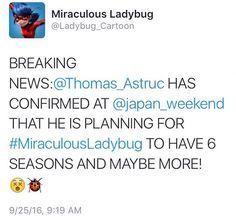
And now look take a look at the possible shows structure:
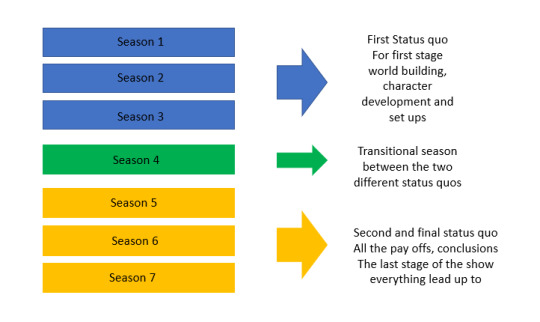
- s1-s3 was the first status quo and built up everything so now they can pay off after pay off while...
-... S4 is now the transitional season where the old status quo gets left behind as we work towards the new one.
-I have nothing to proof this of course, but in the same sense it would now make sense that s5-s7 where/are planned to play out under the final status quo. If I'm not wrong at first the show was under contract for 5 seasons, which would mean that after the transitional season 4 there was only 1 season of the final status quo for sure. Still, done right it could have been worth the wait. But this isn't where Miraculous will end. The show actually got the 7 seasons the creator wanted and THIS is how I think the long term plan makes the most sense. Nothing all too complicated but still hella effective in its execution.
But now back to our two main characters, because Marinettes and Adriens development are the two aspects that will raise the show to the intense heights of the s5-s7 status quo.
From s1-s3 Marinette was the active player but she was hardly involved with the actual PLOT of the show, since most of the plot and backstory of the show lies directly with the Agreste family. She only started to get her own plot when she literally created a new one by getting involved with the miraculous lore, because the closest Marinette got to the Agreste plot was "The collector".
Adrien in the other hand was always literally right in the middle of the plot but he wasn't enough of an active player to bring us further either.
Season 4 is now going to add the missing parts for both of them and as the very beginning of the season showed us: there are going to do it SEPERATLY.
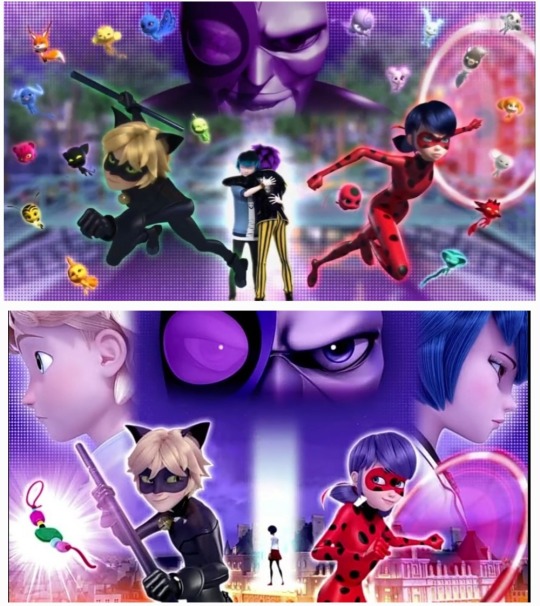
This is why "Truth" and "Lies" have been structured the way they are (One Marinette-centric the other Adrien-centric). Yes, Marinette and Adrien are meant to end their story victoriously together, but they are simply not the people they have to be to become such a powerful team. Certain aspects of their journey they have to do... basically disconnected from the other one. The "Miracle Queen" endcard shows it quite nicely as well where they are heading now: away from each other.
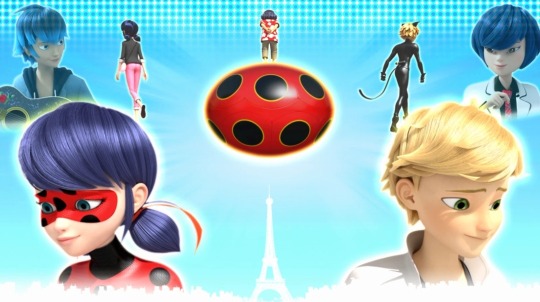
Obviously the season started with Marinette growing into her new guardian status including everything miraculous related, since she is the main lead and because the new ways the episodes can now utilize everything Miraculous need to be established first before we deep dive into the messed up Agreste mystery.
So while I totally agree that it is annoying to get so little Adrien/Chat Noir content currently I also understand the practicality behind it. As I said, before s4 Marinette was the active main character who mostly didn't really have her own plot. So now adding her plot aspect and have her ACTIVELY figure everything needed out means that right now Marinette/Ladybug is the active focus main character who is solving a huge part of her s4 character arc. That simply drowns out Adrien as the currently still mostly-inactive secondary main character who, yes, may be right in the middle of the shows emotional + villain plot/lore/backstory, but that side of the story simply isn't in focus at the moment.
And I gotta say, I'm kinda glad they're doing it this way. Because I'm gonna be honest, when the season starts giving us Adrien/family Agreste episodes like "Lies" and "The collector" (in this case "Gabriel Agreste" for example) again, I don't want the narrative to be forced to spend time with something guardian lore based just because they didn't took their time to do it earlier.
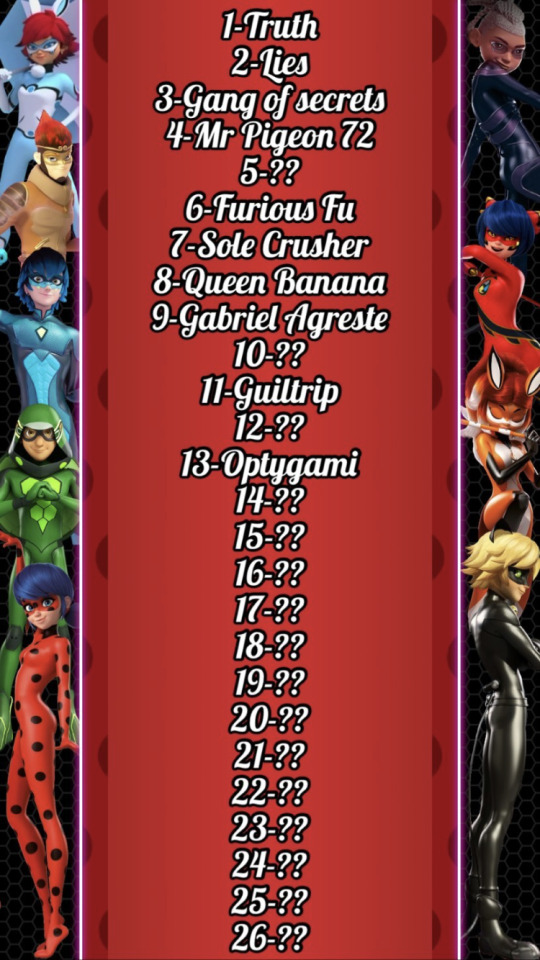
So, as we see on the s4 episode raster "Gabriel Agreste" is episode 9. Honestly, I expect most of it (especially the ones near the beginning, so ep. 5 included) til that episode to be Marinette based the way everything else til now did (besides Lies obviously and Guilt trip didn't hardcore focus on Marinette/Ladybug either and that's because it's after "Gabriel Agreste") in the spirit of "Truth". It's just the needed set up from Marinettes side of the story and I can live with that.
Because we actually saw the change after "Gabriel Agreste" already in "Guilt trip".
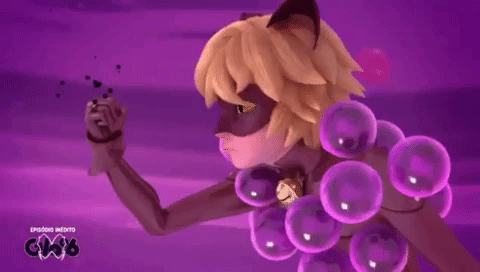
I don't know why some people pretend like Chat almost cataclysming himself after hearing how guilt-eaten Nino is for Adriens sake isn't a huge indicator that the episodes afterwards will not only acknowledge but also DEAL with Adriens/Chats situation and problems. Remember, we are talking about CHAT NOIR here not Adrien Agreste. The show has always portrayed and acknowledged ADRIENS issues very straight forward and with the proper seriousness (especially when it comes to his family), whereas Chat Noir was often mostly used for comedic purposes with some exceptions of his problems being properly delt with (since Marinette/Ladybug was mostly oblivious to them, since Adrien keeps them hidden so well). But now in "Guilt trip" LADYBUG was confronted head-on with just how much negativity Chat has inside and how quickly and extremely he drowns in it.
Sure, correct, the episode also has his negativity "washed away" rather quickly by Ladybug opening up to him on how important he is to her
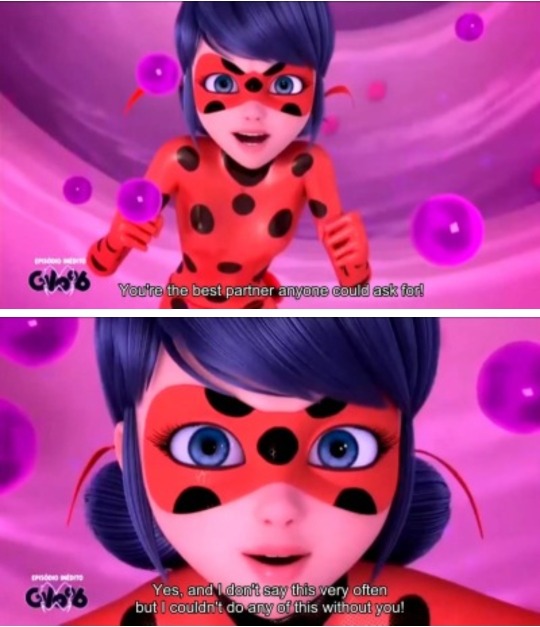
But this is in character for both of them as "Lies" very clearly showed us that the way BOTH OF THEM behave here is where the problem lies. There Ladybug was freaked out after Chat threw his life away once again but quickly accepted Chats very direct avoidance of the confrontation, since he seemed to be alright to her.
Something I also find noteworthy here is that Ladybugs dialog is "Seriously, you need to stop doing this to me!", which is.... a VERY Marinette-centric way of acknowledging the problem.
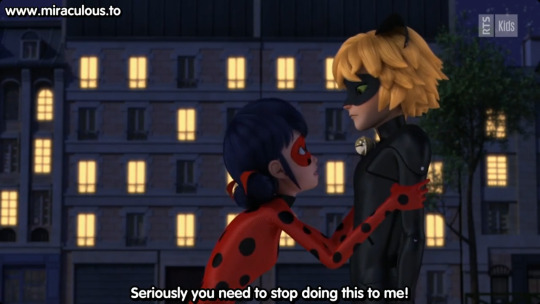
It completely shifts the issue away from Adriens extremely alarming self-harmful/suicidal tendencies and instead only calls out how it affects Marinette (whose feelings here are definitely valid, don't get me wrong!). It showcases perfectly how unaware Marinette still is of her partners inner tumult at that point and also parallels how Marinette called Adriens life "perfect" at the beginning of the episode (This is no shade towards Marinette, in general the entirety of "Lies" is about showing us just how harmful Adriens Chat Noir persona actually IS to him so these two moments of her being oblivious to Adriens and Chats immense problems very much fits into that episodes narrative and sets up what's about to come. I still have an entire essay in the making for "Lies" but, guys, it's just getting longer and longer. I suck xD).
So the fact that an episode after "Gabriel Agreste" brings this scenario back, just a little different but ALOT more revealing of Adriens immense problems to his partner, is VERY telling. Besides other things it tells us that this happens at the beginning of the arc that deals with (at least) Chats issues since Ladybug is still way too quickly too ready to accept her partner as "completely fine" again just because Chat makes it seem that way (while some negativity increasing guilt bubbles still to stick to him.).
And yet, others have already pointed it out that Ladybug IS noticing what Chat wanted to do and reacted accordingly...
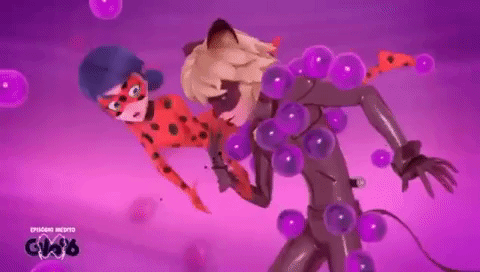
she just didn't speak of it the way it is because it overwhelmed her, which calls back to Ladybugs "You have to stop doing this to me!" dialog.( For a great breakdown of her dialog HERE is a link to @flightfoot post)
In "Lies" Marinette was way too stressed by her new guardian role to even consider Chats side of it and therefore only spoke of her own, but in "Guilt trip" she's already past that stressful arc. So here she is immediately able to recognize Chats suicidal action for what it is, come to his (much needed) aid and lift her partners spirit the best she can by emotionally opening up to him (which is something we KNOW is incredibly hart for Marinette).
The difference between her reaction in "Lies" and in "Guilt trip" shows that Marinette has her guardian role already mostly handled and is now mentally able to be there for others again, so the extremely Marinette-centric "Truth"-like episodes are mostly passed. Now the episodes can bring Adrien/Chat Noir more into the game again and even shift to "Lies" - like episodes because MARINETTE can pay more attention to him again and isn't faced with something new, important and overwhelming Miraculous related every step she takes.
And THAT is extremely fair from a narrative standpoint.
---
I really need to stop elaborating so much on these posts because I'm only NOW actually getting to the point of where Adriens journey will disconnect for a while from Ladybugs. Sorry guys.
Okay, to understand where I'm going with this I will have to quickly explain how I always saw Chat Noirs place in the Ladybug+Chat Noir vs Hawkmoth war ever since s1.
Because here is the thing: Adrien wasn't able to truly leave the battle field ONCE since the origins. Marinette was completely out of Hawkmoths and Gabriels reach once she detransformed, which balances out her basically being the personification of the good sides force. And Gabriel literally decided whenever or not the battle is even ACTIVE right now! Besides that he is in complete control of his own actions and environment, which gives him all the necessary time, safety and downtime he needs to act as the personification of the evil sides force.
Marinette and Gabriel always knew when they were safe and off the battle field, but ADRIEN never had that and it left him LITERALLY right in the middle of both Ladybugs and Hawkmoths sides.
You see, because before Adrien became Chat Noir he basically was part of Hawkmoths side just by default. He was born into this family, that's his father and lost mother and everything he knows. Adrien didn't/doesn't even have to KNOW that he is part of Hawkmoths side, he's his son at some level he just IS! And I'm not saying this as anything negative, Adrien coming from Hawkmoths side is literally the reason why he became Chat Noir!
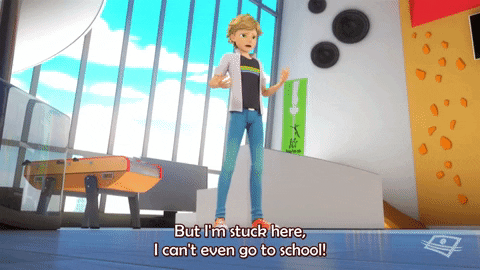
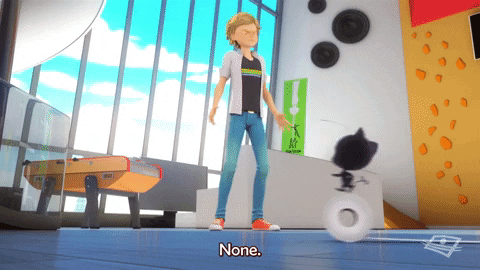
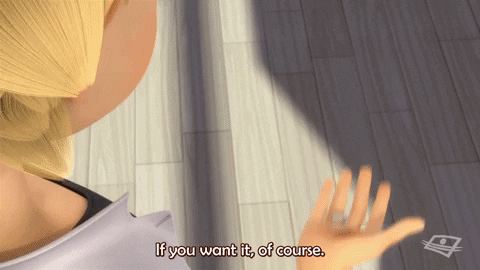
Because whereas Gabriel is having the time of his damn life as evil terrorist, created out of tragic and sinister circumstances, ADRIEN on the other hand couldn't handle his families environment and very same circumstances anymore and accepted the role as Paris' hero to escape his heritage for a while.
Keywords being: a WHILE.
Something unique about Adrien I always loved is the fact that he is the villains abused, isolated and overworked SON, who becomes a hero to escape his depressing life and YET it was never Adriens intention to LEAVE IT. Adrien merely wanted to use his time as Chat Noir to let of some steam and breath freely while doing some hero work so he can go back into his civilian life and try to one day successfully ment his broken family. He couldn't handle the current situation anymore but he still always saw worth in his family/father. I have SO MUCH respect for that!
But him not intending to leave his family and instead regaining strength as Chat Noir to continue to hold onto it came with the downside of him not being able to fully become part of the good sides people/force either. Hence why Adriens/Chats place always felt so lost in comparison to Ladybugs and Hawkmoths clear positions. He's caught in between their extremes trying to balance out BOTH at the same time. What an impossible task!
So he couldn't put in the same focus as Ladybug into being the good sides force because he is literally burned out from his civilian life on Hawkmoths evil side. But he also couldn't be involved as an ACTIVE member of his fathers evil force, because he chose to find refuge in his friends and as a hero on Ladybugs side.
Adrien unknowingly is part of BOTH the shows two extreme moral sides of good and evil and this season we will see Adrien/Chat Noir grow into his own within BOTH sides as well.
Because he simply couldn't have done so right away in s1. Now after 3 seasons Chat Noir is more than solidly established as one of Paris Heros and his time with Ladybug, the other heros and his normal friends helped him greatly to find his place on the good side. "Lies" set this up as Chat Noirs arcs starting point that now he has to stop connecting "being heroic" strictly with following Ladybug (as Marinette is the STAND IN personification for the good side, she's still a flawed human being like everyone else and not the ultimate force of perfect and good. Big difference.) just as he has to start looking past his fathers sympathetic moments/qualities to see that Hawkmoth isn't a 100%, inhumane monster just because he is the stand-in personification of evil in their fight, but the man he calls Father and still needs to be taken down. (I talked about this in more detail on THIS post)
Adrien has to seperat himself from Ladybugs path and focus on his family and I believe it'll start with the much dreaded (but expected) Ladynoir fight.
Funnily enough, what I'm talking about was actually already set up in "Frozer" I just didn't remember that for a bit. In "Frozer" we saw Ladynoir having a fight which caused Chat Noir to go his own way in the episodes battle.
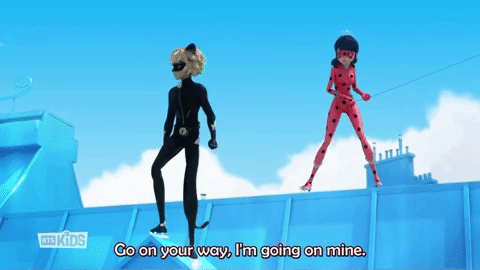
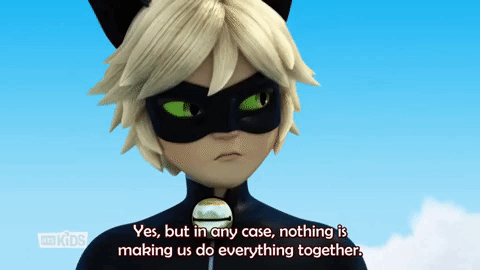
I always found it interesting that the episode didn't had Chats decision, to not follow Ladybugs lead here, turn out to be a huge mistake. Almost every other show would have done so but now I think I understand. This episode and s2 in general SET UP the s4 conflict, s3 LEAD UP to it and now s4 DELIVERS it.
So what happened in "Frozer" is a direct parallel to what about to go down:
Ladynoirs fight will cause Chat Noir to not simply follow Ladybugs side anymore the way he used to, but note, he DOESN'T leave the good side AND they make up again in the end after Chat saves Ladybug from the akuma. He just does things on his own because he isn't on great terms with her for a while. "Frozer" showed Chats decision to not only NOT be a mistake but also a necessary part of defeating the akuma, just the way it'll be in s4. Damn, Adrien breaking away from Ladybugs side, the way she (unintentionally tho) did at the beginning of the season, to focus more on himself and his family will be the game changing factor, when Adrien will have his completing arc where he goes from "not active character within the villain/backstory plot" to "ACTIVE character within the villain/backstory plot".
And we already saw with Marinette how many fast breakthroughs we get through these completing arcs. Which is also a reason for why Adriens/ Chats arc comes later in the season, because BUDDY. Once Adrien starts to actively uncover his families mystery and fathers secrets Gabriel is SCREWED! Adrien will gain the needed inside knowledge that complements Marinettes Miraculous power; and reunited they can take on whatever the hell kind of scale the Agrestes plan actually is.
So how to end this post? My biggest intention was to raise hope for everybody (myself included lol) who is right now very concerned and upset about how side-lined our boy is at the moment. But I prefer doing so in a way that actually works with canons context instead of sugarcoating what I don't like. And Adriens/Chats current position I definitely do NOT like but accepting it as realistic outcome from s1-s3 and set up for the escalation for both Ladynoir and his home situation gives it the proper purpose and pay off (narrative and character wise) that it SHOULD have.
Basically, the endcards of "Truth" and "Lies" show it perfectly.

It looks like ShadowMoth is turning a blind eye towards Adrien/Chat Noir because of Ladybugs new guardian status and "greater importance". But Gabriels tunnel vision on Ladybug will leave him vulnerable to his own sons secret actions against him and Gabriel won't see it coming until its already too late.
#Miraculous#Miraculous ladybug#ml theory#ml analysis#ml season 4#ml show structure#Adrien Agreste#marinette dupain chang#Gabriel Agreste#Chat Noir#Ladybug#Hawkmoth#ml forshadowing
180 notes
·
View notes
Note
The english side of me REALLY jumped out with this one lol
Possessiveness, jealousy, and overprotectiveness are staples of the romance genre, especially when it comes to paranormal romances, so much so that it’s expected for people to overlook the problematic aspects of possessiveness, jealousy, and overprotectiveness because these concepts in the romance genre are meant to be viewed not only as hot and sexy, but indicators of love and showing that the person cares. Despite their tendency to fall in the yellow flag zone, these concepts are meant to further the romance itself. And when you begin to question these concepts as they appear in different romances, there’s almost always pushback with people saying the books are “just fiction”. But what happens when there’s evidence that shows why these three concepts aren’t always healthy or hot/sexy in a romantic pairing? What happens when the narrative is using these concepts to show how they can be detrimental to a character and those romantically associated with that character?
Possessiveness/Overprotectiveness
In romances, it’s always in the man’s nature to be possessive and overprotective. These two concepts are usually used to show that a character is protective of their partner and we see that happen with almost all of SJM’s endgame ships, but they’re almost always portrayed as good/healthy because of the equal partnership that is present in those relationships. Thinking about acotar, a relationship where possessiveness and overprotectiveness were depicted in a negative light was between Feyre and Tamlin. Their relationship was imbalance and Tamlin’s possessiveness/overprotectiveness of Feyre stood out in the barriers he placed on Feyre when they were together: not letting her leave the house/keeping her in the house; saying everything is for her “protection”; only letting her talk to Alis and Lucien/limiting her interactions with others; telling Lucien to back off from Feyre because Tamlin saw him as a threat and that she could fall for him instead; having Feyre be dependent on him by not teaching her how to fight/learn how to use her powers; controlling every aspect of Feyre’s life at the beginning of acomaf; among other things.
Males in acotar feel an intrinsic sense of entitlement to their mate and are described as being protective and possessive over their mates. When people say that A is exhibiting “mate behavior” towards E, obviously there is a positive connotation associated with that phrase because of how the males act around their mate. But the thing is A isn’t E’s mate. A’s possessiveness of E is treading on the waters of Tamlin-ville because: A speaks for E, which is oddly similar to what some of E’s stans do in fandom discussions (as if E herself reached out of the book to personally tell them things that no one else knows); he makes it known that E shouldn’t help with the Dread Trove, which is an example of A attempting to limit what E does; and he subtly expresses a sense of entitlement over E in the bonus chapter during his conversation with Rhys when he questions if the Cauldron was wrong in pairing E with Lucien. A’s “mate behavior” is completely different from Rhys and Cassian because Rhys and Cassian are canonically mated to Feyre and Nesta, which plays a role in how they act towards them. Also, neither of them attempt to limit what Feyre and Nesta do even if they worry about their safety. To say that A is exhibiting “mate behavior” towards E would have the same effect as saying Tamlin was exhibiting “mate behavior” towards Feyre. I think that the reason A’s actions towards E are described as mate-like is because thinking otherwise calls his actions into question. I assume some people aren’t ready for that conversation because he’s been portrayed as the sad bat boy in the fandom for so long that it’s probably hard for people to come to terms with this not being the case.
When people say A being overprotective of E is similar to Rhys and Cassian being overprotective of Feyre and Nesta, the comparison becomes incomparable because A is overprotective of E to the point where he goes against what E wants to do (E stating she wanted to help find the dread trove, a scene in which A was present and later A said E shouldn’t be exposed to its innate darkness), while Rhys and Cassian know Feyre and Nesta are capable of fending for themselves in dangerous situations. It’s just ironic that A’s overprotectiveness in this moment contradicts E’s “choice” of wanting to help, yet I don’t see that being mentioned in those “choice” arguments.
Jealousy
Jealousy in the romance genre is always meant to further the romance between the love interests and we see that happen with rowaelin and chaorene (and probably other SJM ships too). But when the jealousy and the romance are disconnected from each other, that’s meant to show something about the character who is jealous and what they’re jealous of. On the second page of the bonus chapter, it’s established that A is envious of Cassian and Rhys and that the reason he remained downstairs by the fire was so that he didn’t get swallowed up by his jealousy in his room. Then on the third page, it’s revealed that the reason he stayed by the door at Solstice was because “he couldn’t stand the sight of it, the scent of their mating bond, and needed to have the option of leaving if it became too much”. There is a blatant reimagining happening with A’s bonus chapter to make it seem as though his jealousy is romantically coded when the jealousy has nothing to do with his relationship with E and more to do with him. This reimagining has to be a case of people seeing what they want to see because I highly doubt people are out here failing literature class.
The Romance Genre & SJM
A and E’s interaction in the bonus chapter is frequently compared to Wings and Embers. The only similarity between these two chapters is the sexual undertones, which is part of the reason why I think people compare them in the first place because everything else (the structure of the chapters, their contents, and the amount of characters involved in them) is different. I think people are hiding behind the sexual undertones of the bonus chapter in hopes that it somehow overshadows not only the oddness of A’s interaction with E, but the ending of the bonus chapter as well. And even more than that, A giving away the necklace is compared to Cassian tossing Nesta’s present in the Sidra. Since A is able to give the necklace away that should tell you about the significance of the necklace’s connection to E herself (if A can easily give it away to the next person on the street) whereas Cassian regifting Nesta’s present would probably be meaningless to someone else because it was Nesta specific.
We know that acotar is more romance heavy compared to tog and cc so I can see why people lean more on the conventions of the romance genre as a basis for their arguments. And this is fueled by SJM saying this new trilogy will have one couple per book. However, the downfall of these arguments is that oftentimes the plot, narrative structure of this new trilogy in particular, and individual character progressions are secondary or afterthoughts to the romance they support. These arguments lack any real substance because acotar has proved time and time again that both the romance AND the plot work in tandem, going against the broad strokes of the romance genre formula where the romance is primarily in the spotlight.
Basically, why do you think A’s possessiveness, jealousy, and overprotectiveness of E is romanticized? Why do you think A and E’s dynamic is constantly compared to feysand and nessian? And why do you think people take issue with A being compared to Tamlin?
I think that the reason A’s actions towards E are described as mate-like is because thinking otherwise calls his actions into question.
THIS
I hate the whole discussion of "mate behavior" because the series doesn't even explain that very well. Rhys can't explain why people are mated, if it's for reproduction or being "equals" (in what sense, who knows), the courts all handle acceptance/rejection differently, the consequences of rejection are unclear and make it seem like the woman is beholden to accept on pain of... causing someone else pain.
I agree 100% that people (maybe unconsciously) try to ascribe "mate behavior" to Azriel in order to excuse what would ordinarily be inexcusable. He doesn't have some magical thing making him act this way. Neither did Tamlin, and we know how people view his behavior. And that's another thing with "mate behavior" and the bond. Why would Tamlin and Feyre not be mates, if all it took were these extreme possessive and protective behaviors? Why aren't Az and Mor mates?
And it's not even about Elain! Az acts like this with Mor, and we know there isn't a mating bond there. Azriel has zero reason to behave the way that he does, not in the same way that the mating bond gives Rhys and Cassian an "excuse", flimsy as it is, for the way that they act around Nesta and Feyre. Even that excuse is crap, because we have Rhys out here leaving Feyre's abusive ex alone, and then we have Lucien doing the same with Graysen. The definition of "mate behavior" that some of the fandom is working with... is sus.
The fact is that no matter how "overprotective" and possessive Rhys and Cassian were, they never prevented Nesta or Feyre from doing what they wanted. They might have gotten their hackles up, but then they backed off. Rhys sent Feyre into the Weaver's cottage. Nesta went to war. There is a balance between caring deeply and passionately for these women, and recognizing them as individuals whose autonomy should be respected.
The jealousy is 100% not about Elain. It's not about Elain being with Lucien. It's not about Mor, because we know that it's not really about Mor sleeping with Helion. Azriel has 99 problems, and 98.5 of them are about his childhood and his loneliness. The other 0.5 problem comes in the shape of a snowball.
The only similarity between these two chapters is the sexual undertones
You know I haven't done a full blown comparison between these chapters, but I'd agree. The entire Wings and Embers short was about Nesta and Cassian. There were no other characters and they learned a great deal about one another. What did Elain and Az learn about one another as people in the first third of his POV? Nothing. There was no tension between them other than sexual. Cassian thought Nesta's name over and over, thought about her as a person and her personality and how she made him feel. Azriel literally only thinks about fucking Elain. There is nothing wrong with fucking, obviously, but that's not love. (Maybe I should fully compare them idk.)
It's when we look at everything he doesn't say in conjunction with how he treats Elain and Mor in other scenarios... that's troubling. People can misread our 😬 at his behavior all they want, but the fact is that Az didn't have a single kind, original thought about who Elain is. His POV gave us zero extra insight into who Elain is as a person, which is... startling, if we are supposed to think that they know one another so incredibly well and have such intense feelings for each other. Why would we not get additional insight into her character? We get a lot of insight into Az's character for sure. But following his POV, if he loves and knows this woman so well, we should feel that. We should know why he loves her, what he knows about her, we should... just get some more damn insight into her character, if we are in the POV of someone who supposedly knows her so well!!!!
You know it's funny though, because the Az and Elain interaction in his POV mirrors when Nesta imagined a threesome with Az and Cassian. Close, and potentially pretty hot, but it never really happened because then it would mess up sjm's plans for the future.
Okay now to your ACTUAL questions haha and not just my reactions to what you said.
I agree that romanticizing Azriel's behaviors is the better option for people who ship it because otherwise the alternative is to accept them for what they are, which is not about Elain at all. Az has an even longer history of being all "mate behavior" on Mor, but no one thinks that's odd? I think that some people pick and choose their evidence, which is a big reason why I keep shoving Mor into these conversations. If the "mate behavior" argument was genuine and had a solid foundation, then the people making these claims would still ship moriel.
The whole thing with Az and Tamlin comparisons.... oh boy. I think there is a lot there.
I think that people don't want to see Az as anything less than perfect sad boi that Elain can fix with her love.
I think that people have a difficult time seeing emotional abuse IRL, to the point where even people who experience it directly struggle to come to terms with it, so why would we willingly embrace its presence in fiction? It also flirts with a lot of the ideas you mentioned being present in a lot of romance, though I'd argue a lot of those elements are becoming passé.
I think that Tamlin is Fandom Enemy Number One while Azriel is Self-insert Book Boyfriend Number One, and maybe people don't know how to reconcile those things. (This is quite literally true, I checked AO3 for reader fanfics and compared numbers between the bat boys, Az/reader fics win by a landslide.)
There also seems to be a refusal to see or accept nuance. I'm not even talking about moral complexity because I don't think that either Tamlin or Az intend to behave the way they do. They aren't villains. It just reminds me of people who somehow don't think Nesta was absolutely horrible through much of the series, even though a huge focus of her arc in acosf was coming to terms with how she had treated people. Anyway...
People see "gwynriel shipper" or "elucien 💕" in a bio and just dismiss arguments before trying to understand them
People try to justify their actions of their faves, which I understand!
People don't understand how subtle emotional abuse can be, and how there doesn't have to be clear intention.
I still plan on pulling out evidence from the book about times when their behaviors mirror one another. But it's like I've said for months - Tamlin is a cautionary tale. I don't think Azriel will go that far, but the foundation is there. The fact that acotar/acomaf was so, so explicit about how Tamlin's behavior was not okay, and yet people can see that same behavior in another character one book later and want to try to excuse it... sigh. Way to miss the point, fandom.
#the brielle tag#ask#not even gonna tag these characters#my stalkers will love this post though#💋#antielriel
73 notes
·
View notes
Note
I just watched the finale and the only thing I can say is...how lazy :/. I mean, this whole season was such a waste. Every episode felt disjointed and I never had any idea why the characters were acting in the way they were. I'm don't even know what I'm supposed to take away from this show; I don't feel like I even have a clear picture of who these characters are since their motivations were so all over the place. And in the laziest move ever, the writers clearly didn't have any idea either so they killed off one lead and then ended it before the other could even really react.
Eve and Villanelle's dynamic was just confusing to me this whole season. I never understood why Eve was so hostile to Villanelle from Ep1, and then continued to hurt her over and over again while Villanelle was pretty much minding her own business. It just didn't feel like a give-and-take--it just felt...mean? I guess the cradling her body after the arrow thing was supposed to be Eve admitting her feelings, but their interactions were always so cold with each other--nothing like in previous seasons where there was always some heated chemistry between them that guided their actions even when they weren't with each other. Them finally getting together would have been more satisfying if it felt like they actually liked each other leading up to it.
Other qualms:
Why was taking down the 12 as easy as stealing Helene's phone and killing them all on a boat in a one-minute montage?
Who tf is Yusuf? Where did he even come from and what organization is he supposed to be working for?
What is the point of Pam's character? (Don't get me wrong, I liked her but I'm struggling to understand her narrative purpose in relation to the leads). At first I thought she was going to be a kind of foil for Villanelle--a young recruit who "takes her place" metaphorically--but that didn't happen. Is her quitting supposed to be juxtaposed with Villanelle's death, who couldn't escape after what she'd done? But if that act is supposed to be a kind of justice, then why did the show end with Carolyn prevailing, which seems to be the opposite of justice?
I'm not surprised at a show that lets its gay characters get together and then in the very same episode punishes them by killing one off. Is this supposed to be groundbreaking? I'm bored.
Anyway, thanks for keeping me sane with your posts. I'm glad I'm not the only one who thinks we deserved more from this show.
I think that's just one of the million disappointments from the finale. You always want to me left with some kind of message about the journey. What was the purpose, what was it all for, what did it mean? And I think we all felt we had a pretty firm grasp on that...until we didn't. Somehow they managed to annihilate the very purpose and meaning of this show in one 3 minute montage.
One of the things I hated most about this season was how disconnected Villaneve felt. Because as you said, normally even when they weren't together you could feel that thread and that pull and that chemistry. Their dynamic was strange and filled with hostility this season, that it destroyed my ability to feel that same pull. Looking back, maybe that was the point. The show clearly wanted to drive home that point that ultimately Villaneve shouldn't be together. I think the real reason is lazy writing. They didn't know how to write Villaneve in a meaningful way so they just injected a heavy dose of hostility to justify keeping them apart.
Your point about Helene's phone has been driving me INSANE because it is one of the laziest examples of writing. Helene was literally having people tortured to find out who different people within the Twelve leadership were, but then was also invited to a Twelve leadership meeting?? If she goes to leadership meetings, she would already know who they were!! It was an extremely lazy way to lead Villaneve to the Twelve.
I still have so many questions too, both about things never answered within the show (why were new characters introduced and what was their purpose other than eating up screen time) and also about certain decisions that were made. (why such a vile and cruel ending and why would no one listen to the queer writer in the room).
Killing Eve let its audience down in such an utterly unbelievable way, not only with the finale which will always, always hurt, but with s4 as a whole. It's mind boggling how they could be so out of touch with the people who watch the show
14 notes
·
View notes
Text
Character Primaries (the "WHY") & Sources of Narrative Conflict
Conflict in fiction provides tension, stakes, and perhaps most importantly room for growth and change.
This series of posts will take a look at narrative conflict and how to define, track, codify, and cause it using @sortinghatchats Primary House sortings.
(Unfamiliar with Sorting Hat Chats? Check out a broader overview of our system here.)
Let's start with...
CONFLICT BETWEEN CHARACTER AND SELF
The conflict here is a disconnect between what a character does and what they think they should be doing.
Framing characters this way gives us a potential and a direction for growth and change. If you start your story with a character who is falling short of their own expectations, it can be particularly satisfying to see them grow and reach those expectations by the end.
For instance, Jason Grace of Rick Riordan’s The Heroes of Olympus books is a Hufflepuff Primary who leaves an insular childhood in a Roman camp of demigods and finds himself meeting a larger and larger world. While he’d been satisfied with his original home and community, he’s faced with new waves of people, magical creatures, and even gods to sympathize with and consider.
Jason had known his place in his first community, but much of his journey in the series is finding a way to express his Hufflepuff ideals of fairness and empathy in a world that is so much bigger and more populated than he’d understood. As Jason grows more aware of the larger world, it’s a burden he lays on himself to rise up and meet the world with the evenhanded compassion he expects of himself.
Sarah, the protagonist of Orphan Black, is also an example of a character struggling with their own self and their own morality.
Sarah, con artist and Slytherin Primary, begins the story devoted to her young daughter. However, she has a long history of failing to properly prioritize and protect her daughter-- a failure of a loyal Slytherin's moral code.
Among the show’s government conspiracies and genetic engineering plots. one of Sarah’s main challenges is living up to her own Slytherin standards of loyalty and devotion, and properly being there for her child.
Jason and Sarah are both positive examples of characters who succeed in growing to meet their own expectations-- but watching a character be forced to edit, reinvigorate, or fail to meet their own moral code can be satisfying in different ways.
The standards a character holds themself to, and the ways in which they fail and succeed at meeting those standards, can drive a character’s inner and outer journey.
CONFLICT BETWEEN CHARACTER AND CHARACTER
When characters have different moral frameworks, they can disagree on what and how to prioritize, and ultimately which decisions to make.
Where a Slytherin Primary values their own wellbeing and the wellbeing of their closest allies first and foremost, a Ravenclaw follows the ideals they have considered and decided upon, even at the expense of themself and their friends. To a Ravenclaw Primary, this sacrifice is moral. To a Slytherin Primary, it’s wrong to abandon your own.
This basic disconnect of morality, if pushed into an ultimatum, can lead to irreconcilable conflict between your characters without sacrificing your readers’ ability to empathize with both sides.
A Resonance of Conflict
You can also generate conflict between characters with the same basic moral framework—the same Primary. It’s important here to emphasize that Primaries define a moral framework, not the actual contents of that morality.
Characters with the same basic framework—a Gryffindor’s faith in an inner moral compass, for instance—can still have wildly different views on right and wrong.
In the fourth season of the animated series The Legend of Korra, the main hero/antagonist pair are two Gryffindor Primaries.
Korra, our protagonist, faces off against Kuvira, a powerful, assured general with a strong vision for a united Earth Kingdom. They both come by their moralities through a strong moral compass, internal certainty, and a certain ethical stubbornness– but Korra is the maturer of the two Gryffindors, less arrogant, more selfless, more humble.
The season uses bold, brash Kuvira to show how far Korra has come from the similarly bold, brash girl of season one, whose thoughtlessness left damage in her wake.
Cooperation is as important as conflict in a story.
Characters supplement and strengthen each other—for instance, a Gryffindor Primary intent on a crusade might be backed up by a Slytherin who doesn’t feel strongly about the crusade, but nonetheless has skin in the game because they love the Gryffindor and want to keep them safe.
A Ravenclaw might decide on the same style of community-based morality as a Hufflepuff, reaching the same conclusions from disparate paths.
It can add a diversity and nuance to the various stakes and motivations in your story to have characters take different paths to reach similar conclusions. It can make your world and your characters feel more complex and real.
Commiseration turns to Chaos
Your characters might also begin the story holding the same beliefs, but then disagree and grow apart as the story pushes them into situations that challenge those beliefs.
For instance, a Slytherin Primary’s loyalty-based morality requires them to stand by those they love. A Gryffindor who also values community and loyalty, perhaps, might make those same decisions.
But forced into a more extreme situation, where a Slytherin might continue standing steadfast, a Gryffindor could make a different moral choice, blindsiding the Slytherin who thought they were on the same page.
This sort of conflict can add feelings of surprise and betrayal while keeping a consistent characterization.
In Smallville, Gryffindor Clark Kent and Slytherin Lex Luthor become friends in Clark’s youth, before their inevitable eventual rivalry as adults. It’s this Primary divide that drives them apart in the show.
Lex bonds hard to Clark with all of a young, healthy Slytherin’s generosity. Clark returns the affection, but when push comes to shove he’s a Gryffindor. He’ll do what’s right before he does what’s right by Lex, no matter how much he likes his friend.
Lex sees this as betrayal, long before Clark is actually willing to act directly against him. Similarly, Clark sees Lex’s partisanship as a growing sign of evil or untrustworthiness, especially as Lex builds more walls between them.
Younger and less experienced characters are more likely to be blindsided by this sort of Primary mismatch. This might be the first time they are forced to recognize their inability to consistently predict people they think they understand. They are more likely to assume that people who make the same decisions as they do arrive at those decisions by the same reasoning.
One Character's Trash...
Similarly, actions that are satisfying for one Primary House sorting can be unsatisfying for another.
You can have characters who do the same things but for different reasons and with different conclusions about whether that action is "good" or not.
Maybe the Gryffindor wasn’t ever convinced by the Slytherin-looking morals they were sporting. Maybe they thought it was a weakness, a sacrifice they were making for their family, or maybe standing by their loyalties was the best they thought they could do as a powerless person in an unjust world.
When they reclaim their Gryffindor moral compass, or embrace their ability to act on what they think is right, they abandon the Loyalist morality that was unintuitive to them.
For the Gryffindor it’s a moment of freedom, realization, and self-actualization-- but for their Slytherin, who’s deeply satisfied and validated by the morality they thought they shared, this can be an especially shocking and confusing betrayal.
...
Next, we'll talk about conflict between Character and World, and between Character and Story.
277 notes
·
View notes
Text
The more I think about it, the more I realize that Mahidevran's "The death of Ibrahim Pasha is a lesson for all of us. Especially for you. Do you know why? Because you're so similar to him." in E84 and Valide's "You once asked me what's the difference between you and Hürrem..." in E55 are the same scene, only that the former was done slightly better than the latter. Both have words which would come out as odd or unusual for the characters that said them, in both cases the words are about comparing two other characters (except that the E55 words are about difference, while the E84 words are about similarity.) and in both cases the words come to a general conclusion about both of these characters that is very obviously hammered in by the narrative itself. All of which reads as a somewhat forced try to prove a point, rendering Mahidevran as suddenly outright hypocritical to one of her biggest allies, somehow discarding that she considered his death completely unjust a while ago and Valide as biased to an extreme for a situation she is retroactively wrong about, while the episode itself isn't rooted in Mahidevran's favor and the scene is supposed to present Valide's turning point, which didn't connect to Aybige all that much.
But what E84's scene does better is that it actually fits the material of the episode and the one before it (the reactions and aftermath of Ibrahim's death) in a thematic way, it's not severely disconnected from the context of the particular episode like E55's scene, which makes it come out in a more fitting time and place. It's not set up as some "victorious", long time coming "realization" through its composition and soundtrack, it's simply the end of a confrontation of two mortal foes that can be seen more easily in an usual antagonistic exchange between them. And Mahidevran's line that it's a lesson to be learned is presented as exactly that: a "lesson", a one and done delivered "message" to the character it's addressed to, nothing else. It doesn't represent a big, apparently consistent change of perspective solely disguised as said "message" that is actually overshadowed by another, more concise scene in the next episode. Of course, both lines contain some truth in them - but it's one thing for that truth to be presented in a circumstance where it ceases to hold any real weight, it's another for that truth to highlight a similarity between two characters that may have the chance to come in handy in the future for the arc of one of these characters, as well. (Hürrem won't ever say out loud that she "tames" SS, even though she can definetly help influence him in some matters, but she has the similar amount of ambition that in turn makes her consider herself "unbeatable" at points, which opens her fatal flaw.) E84's scene doesn't reveal a distinct character perspective by any means; the character uttering these words is literally the mouthpiece for what the narrative wants the audience to hear and it's as far as it goes. (as seen in Mahidevran asking Fidan whether what should be done to respect Ibrahim's memory in Manisa is done by the next episode.) And while both the scenes have a statement or "fact" about the one delivering it that can be instantly taken at face-value by the fandom without any of the nuance, E84's scene has a single narrative purpose and sticks to it. And it's much clearer that it does.
[Even if there is an aspect of it that presents a changed perspective to an extent, it is more strongly tied to the way Mahidevran views death than the way she views Ibrahim, unlike E55 Valide's directly changing opinion of Mahidevran. Despite of her still grieving for the deaths of those she loves, Mahidevran is always more inclined to look into the future (we have this with her insistence not to lean on the past and the actions she took after Valide's death) and additionally, stay strong and give courage to the people who are still mourning. (Mustafa's death) That's why these lines can add to this in that sense and look like natural character development, her moving forward and even learning something from it, but still appreciating Ibrahim and wanting those who had a part in his death to pay. The sudden element is as jarring as E55's scene, with Mahidevran starting to make a distinction between Hürrem and Ibrahim just like that, but I'd take it over the completely unfitting mess of a scene that makes no sense where it's in and comes out of absolutely nowhere any day.]
#magnificent century#muhteşem yüzyıl#muhtesem yuzyil#mahidevran sultan#valide sultan#hurrem sultan#ibrahim pasha#episode 55#episode 84#another Mahidevran post in a row yes I know#but I do have stuff to say here
45 notes
·
View notes
Note
What do you think about Kaneki x Eto?
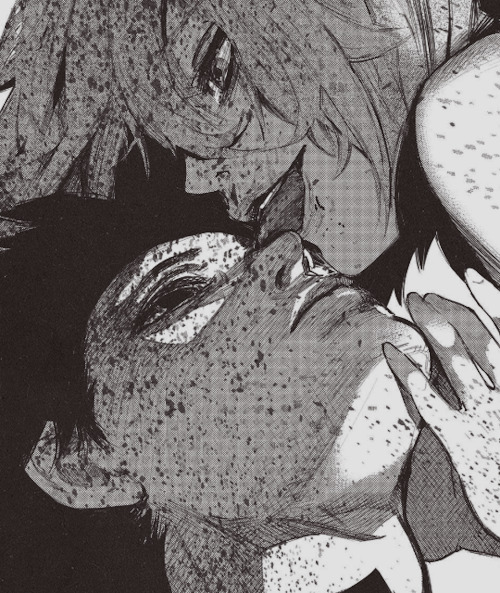
It’s my favorite Tokyo Ghoul ship? If you want to know my opinion of it, I did write a whole fanfiction on the ship. However, I can also explain my reasons for liking the ship with some character analysis. Basically, Kaneki and Eto are the same person. Kaneki loving Eto is him learning to reconcile the ugliest parts of himself. Falling in love with someone who’s just basically you in the mirror is a good way to learn some self esteem. Kaneki and Eto are the same because they’ve felt ostractized and unloved their entire lives due to having selfish and manipulative mothers, and uncaring or entirely absent fathers.
Their response to their total sense of isolation and status as outsiders is to write a story. They both have a narrative coping mechanism of the world, that’s why of all the characters they are the most highly associated with reading and books. It’s just they assign themselves different roles in the narrative. Kaneki is the protagonist of the tragedy, and Eto is the author of the tragedy. It doesn’t change the fact they see the whole world as one big tragedy. More under the cut.
1. The Protagonist of the Tragedy
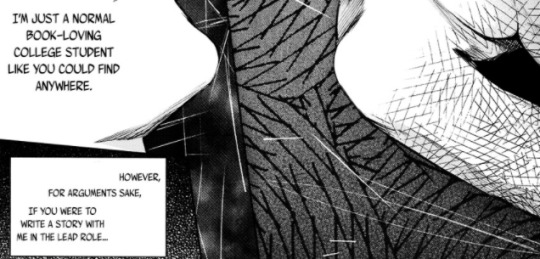
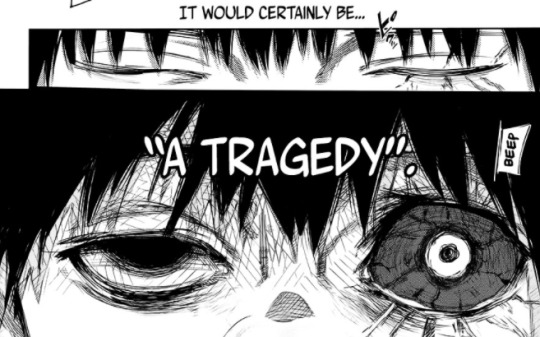
Kaneki’s coping mechanism has always been to imagine himself as the long suffering protagonist of the tragedy. His statement is twofold. “I’m not a protagonist or anything” and then “However if you were to write a story with me in the lead role it would certainly be a tragedy.”
This is paradoxical thinking. What Kaneki is saying essentially is that he is not a protagonist, but he is. The difference between a protagonist of say, a heroic epic, and the protagonist of a tragedy is that a tragic protagonist is ultimately helpless before their flaws.
Kaneki has always been outside of things. He is someone extremely isolated and lonely. He has difficulty connecting even to his lifelong best friend. Hide describes him as thus, he’s always pretending around other people and hiding his true self. Kaneki has this genuine fear of being well... genuine. He avoids emotional intimacy at any cost even though it’s the thing he craves the most.
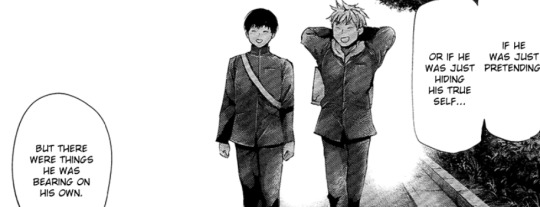
Which is why it’s easier for him to cope with things through a fictitious lens. He wants to be important to people, but he doesn’t really know how to be loved, so he always, always, always, chooses fighting for their sake instead. He plays pretend hero, pretend vigilante, and even pretend king depending on the circumstances. He is always, playing roles for the sake of others instead of trying to be his own self. He pretends to be a protagonist.
However, because of his abuse from his mother Kaneki is also unnaturally fixated on being a good person. He can’t bear to think he’s unkind, or cruel, or even violent like his mother was to him. He has such a strong, nauseous reaction to violence, he can’t even accept it within himself even when circumstances have dirven him to become violent.
So, rather than the protagonist he also wants to keep playing the victim. The victim is helpless. The victim is sympathetic. The victim isn’t to blame for their actions. Kaneki is afraid of being in control of his own actions, because he finds it hard to face himself and his own flaws and bear that responsibility. Kaneki’s coping mechanism is to feign helpelessness. To never truly make decisions because therefore he’s not responsible when he makes the wrong one.
It’s not just Kaneki who is coping poorly however. Whether or not he intends to his actions will always affect the people around him. Kaneki isn’t a protagonist, he’s merely pretending to be one. The problem with pretending to be a protagonist is that as a result you assign other people as supporting characters in your story, and forget that they have feelings outside of what you perceive their feelings to be.
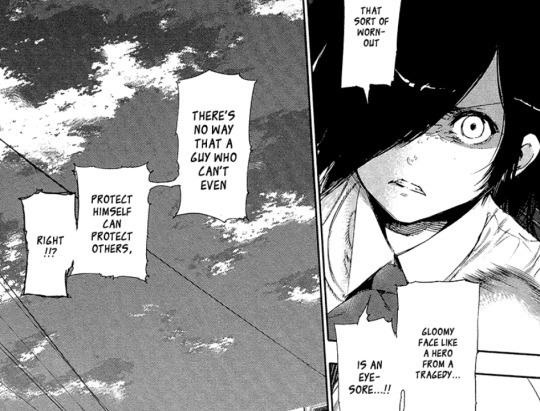
This is specificallly what Touka calls out in 120. She doesn’t want to be the heroine of his tragedy. She didn’t ask for him to protect her. Kaneki does all of these things without thinking or consulting her about her feelings at all and just assumes he knows best. Pretending you’re the protagonist gives you a self-centered view of the world. Kaneki can’t be with Touka at this point, because he can’t accept Touka’s feelings for him.

The most poweful sign of Eto and Kaneki’s connection ever is the fact that Eto has Kaneki completely read like an open book, without even really meeting him in person. It’s because they are in essence the same person. She understands Kaneki’s total sense of isolation because she’s lived it as well for her entire life.
Kaneki feels unloved and disconnected from others, and everything he does ultimately is in response to the lack of love he was shown as a child. That’s why Takatsuki’s lines, your parents failed in raising you. Echo so strongly for both of them.
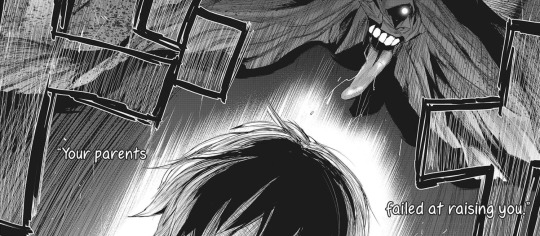
Now kiss you two.
2. The Author of the Tragedy
If Kaneki is someone who will feign helplessness, and avoid being in control of his own life then Eto is the opposite. Eto will pretend to be in control of everything because helplessness is what she fears the most. Eto was born outside of any framework or sense of stability for the world she can’t handle any of it. She longs to knock all of the structures down because they will always reject her and never include her, in the same way that Kaneki longs to be accepted by others.
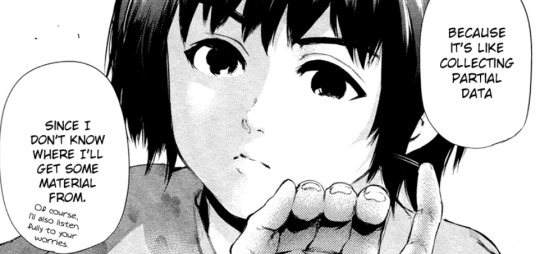
Eto reacts to the whole world like a book too, but she sees herself as the author in control of things. She’s the one writing the scenario. She chooses to bloody her own hands bcause it makes her feel in control of the violence that’s been inflicted upon her, her entire life. The things that Kaneki avoids because he’s afraid of being seen as a monster, Eto embraces willfully and becomes the monster. Eto, just like Kaneki sees everyone else as a fictional character. Whereas, Kaneki assigns them the role of support to his story, Eto sees herself as the author pitting all of the fictional characters against each other.
Kaneki lets himself be manipulated and Eto manipulates. Eto never sees herself as backed into a corner, or desperate. Everything is a planned move on her part. Everything is an intentional sacrifice. If she’s captured, it’s because she willfully walked into their plan and let herself be captured. She’s here because she wants to be. She pretends at all time that everyone is doing what she wants them to.
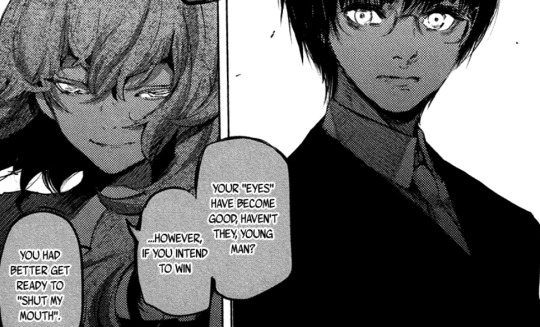
Even when captured and imprisoned in the cochlea, Eto intentionally walked in as a part of her big plan. The thing about Eto’s plans, and plans, and plans is that she’s bad at admitting when she’s losing or things are out of her control. Aogiri could never win an all out war against the CCG. Which is why Eto was too quick to burn Aogiri in a deliberate sacrifice to try to weaken the CCG as a part of her plan, rather than try to take her hands off and try a different approach.
The same way that Kaneki never wants to take control of his own life, Eto never wants to let go of her sense of control. Which is why she’ll pretend to be control even when she isn’t. Eto is just good enough at reading and manipulating people that she can delude herself into thinking that the situation is always in the palm of her hand when it’s not. Which is why things that are genuinely out of her control and impossible to predict have a tendency to explode in her face.
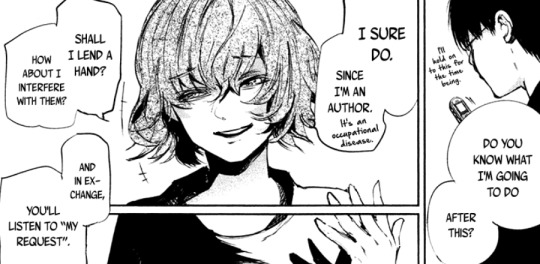
Even when Eto loses, she always sees it as a controlled lost. She wanted Kaneki to defeat her on the Tsukiyama Tower and devour her Kagune. She gave him that victory. She is still in control. She is always the author writing down the tragedy.
The key difference between both of them is that Eto externalizes, and Kaneki internalizes. Eto is trying to fix the world to make up for the inadequacy she sees inside of herself. Kaneki is trying to fix something in himself so people will find him lovable.
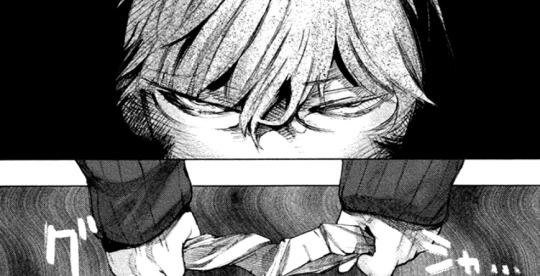

We see in Takatsuki’s flashback chapter that Eto’s resentment of Kuzen and his cowardice, has just as much to do with her desire to destroy V and as her wish for a better world. Kaneki and Eto’s trauma informs their actions just as much as their genuine desire to improve the world. They are wholly created by the traumatic circumstances that have affected them and been poorly coping all of their lives.
The best example to show them poorly coping with trauma is to show how they lash out. Kaneki and Eto are both children raised without any love, and they’ve come to two different conclusions. Kaneki sees himself as unlovable. That nobody is capable of loving him so he sees all relationships as a transaction and services rendered. Eto is the opposite, rather than an internal quality she focuses on an external one. She believes actual love doesn’t exist. That all love is selfish, just like her parents’ love for her ultimately was.
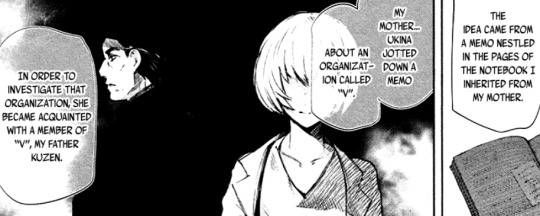
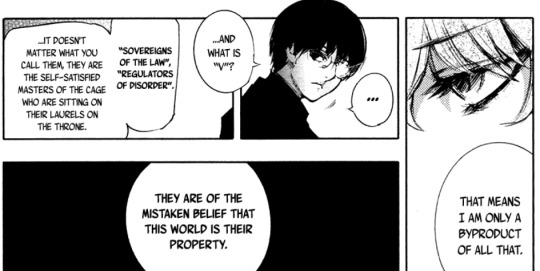
It’s shockingly different the way Eto and Kuzen tell the stories of her birth. Kuzen focuses on the love story aspect, as if Eto was genuinely the product of a love that bridged the gap between two different worlds. Eto believes that her mother was only using Kuzen and sleeping with him to get information, and that she was just an unplanned pregnancy. Eto is incapable of understanding her mother’s love for both her, and her father and chooses to believe no love exists at all. Kaneki on the other hand is incapable of understanding his mother’s contradictory love for him, and chooses to believe himself unlovable.
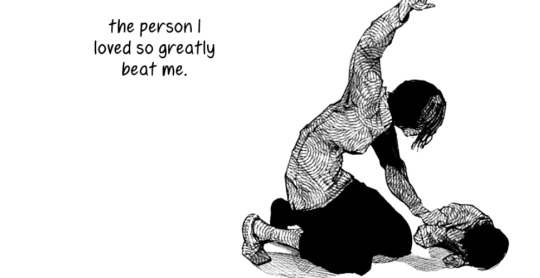

The person I loved so greatly beat me. I loved my mother, didn’t I?
Kaneki and Eto are hurt not because they don’t love their mothers, but they do. Their mothers are extremely important to both of them. Yet, neither mother seems to love them back. Ukina chose Kuzen over protecting her child. Kaneki’s mother chose her sister, and everyone else in the neighborhood to take care of while neglecting and outright beating her child when he asked for basic care. Eto does everything she does in Ukina’s memory to complete her mission, and Kaneki does everything to try to be the good boy his mother wanted him to be for a good portion of his life but neither of them feel loved by that mother figure. Kaneki and Eto were failed on the most basic level by the parents who were meant to be responsible for them and loved them and as a result they are continually coping with that lack of love.

The difference in their coping can be seen how they both treat Kanae. Kanae has an incredible amount in common for both of them. She lives seeking love, she has been orphaned and unloved and treated like an outsider in the Tsukiyama household her entire life even though they were supposed to take care of her as her direct family. She always had a close relationship with her mother before she died. She lives by pretending to be something she’s not in order to look stronger.
Eto’s response is to insist that Kanae’s love is selfish. That she’s an ugly, monster for trying to force her feelings upon Tsukiyama. Eto goes out of her way to try to prove that love is a lie.
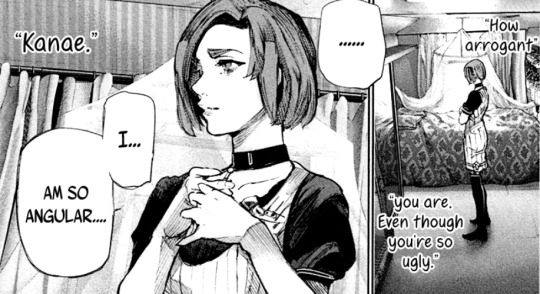
However, Kaneki much more passively also resents the hell out of Kanae. Kaneki’s wish to be loved is the same as Kanae. Kaneki will even become violent for the sake of that wish.
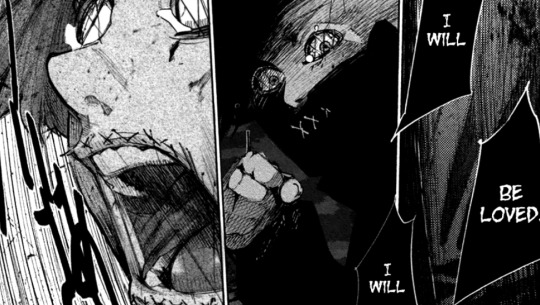
However, this is his response to Kanae at her lowest point.
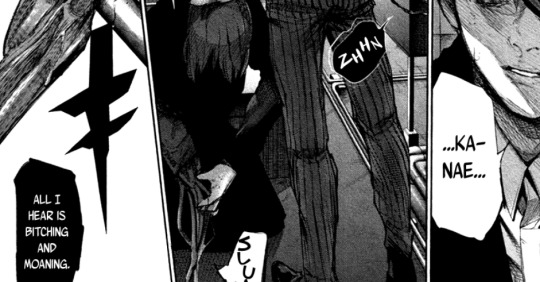

Kaneki’s choice to internalize all of his trauma inside of himself is one that also results in destruction. Remember that this is after Tsukiyama begged Kaneki for mercy on Kanae.
Kaneki’s habits of pretending to be helpless to avoid conflict, lead him into as much conflict as Eto gets into. The coping mechanism is different. The end result is the same. As Haise he spent the entire arc putting off conflict, but he ends up fighting Tsukiyama anyway, ends up brutalizing Kanae in the worst way possible, and even ignores Yoshimura’s wish to save Eto.
They cope very differently. Kaneki is always trying to change himself to suit the needs of other people. Eto is always trying to change other people to suit her own needs. However, the end result is the same. Kaneki’s seems more selfless. He’s letting himself suffer rather than make others suffer. He’s trying to hold it all in, rather than Eto who pushes all of it out. But, both are unhealthy. Eto wants to destroy the world, Kaneki wants to destroy himself.
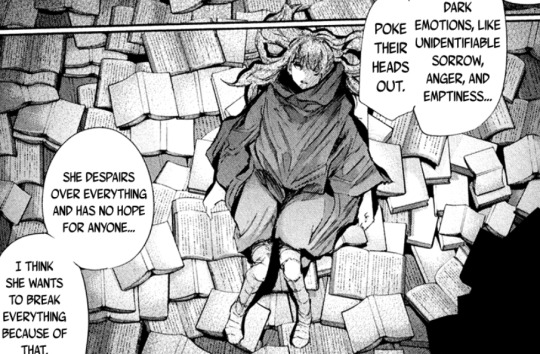
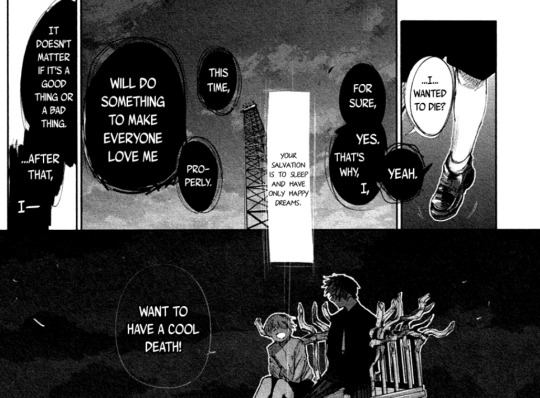
The result is still destruction regardless. Which is why the way Kaneki and Eto both treat Kanae is so important, they’ve both projected themselves onto Kanae, and want to destroy her because of it. They’re coping mechanisms which are meant to preserve them are instead self destructive. Which means ultimately they’re both terribly unhealthy people. The question of which one is good or bad doesn’t really have anything to do with it.
Kaneki and Eto’s relationship is so interesting because they’ve both been pushed to the point, where they’ve stopped hoping for things, and just want to destroy everything. It’s just what they choose to destroy is different, Kaneki wants to self destruct, and Eto wants to take the whole world down with her. That’s why I think they should work together to smash everything into tiny little pieces, and maybe kiss a little bit. There’s just something to be said about a relationship that’s built around learning to love the unhealthiest parts of yourself.
168 notes
·
View notes
Text
A look into Killing Eve’s S3 photography: Camera Angles

"A film is never really good unless the camera is an eye in the head of a poet” - Orson Welles.
Last time I talked about the rule of thirds and the importance of making the audience experience the character’s feelings through the framing and composition using the rule of thirds.
This time I’m going to talk about the most important camera angles used in the show to help telling the story.
Zoom vs Static Shot
With the zoom effect, the frame itself is “moved” by adjusting the focal length of the lens through the duration of the shot. It magnifies what’s in focus without changing the perspective of what’s in the frame, it compresses the background, which serves to pull your eyes even closer into the subject.
We see an example of this technique for a few seconds during Villanelle and Hélène’s meeting in episode 7. In this scene, Villanelle seems about to answer Hélène’s question “Do you have anything you would like to get out of your chest?”
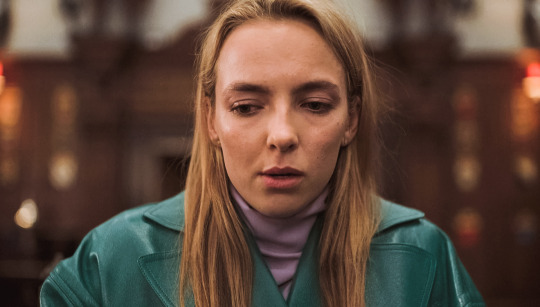
This zoom effect can make a character seem more powerful, but at the same time the compression effect can make it feel like the world is closing in on them, making the viewer feel trapped and claustrophobic. The zoom can also draw us into the feelings of a character by focusing on their expression and isolating it from the scene.
My interpretation here is that it makes the viewer feel interested and somehow nervous about what her answer is going to be. Is she going to say anything she shouldn’t?
Now, what happpens if the camera does the opposite thing and it doesn’t move at all?
Let’s keep in mind this hard to forget scene from episode 5:
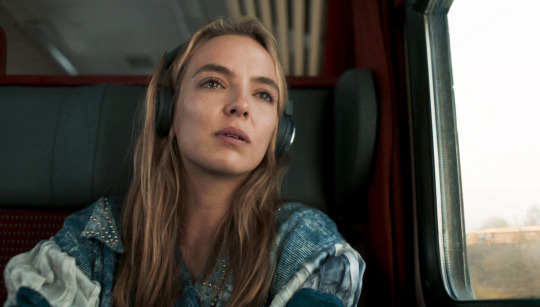
Sometimes what’s happening in the scene is all that’s needed to tell the story. The lack of movement from the camera draws the attention of the audience deeper into the action and intensifies the feeling that they are experiencing.
I think we can all agree that this short scene is one of the best in the whole season and thanks to the static shot, the interpretation, the fact that we can’t hear the music and that there’s nothing that distract us, it makes it an unforgettable scene that gives such a haunting feeling difficult to move on from.
High and low angles
This technique is seen in the series all the time, certain characters are almost always shown with the same high or low angle. Why is this? In the case of a camera shot from a low angle it conveys power, and inferiority if the character is shot from a high angle.
So, who does usually get filmed from a low angle?
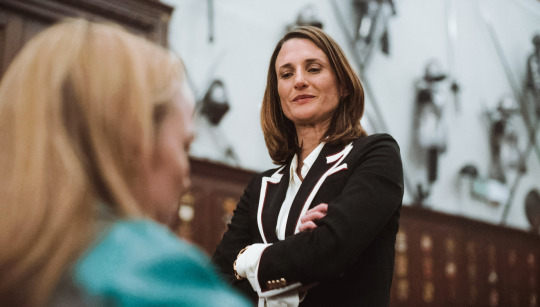
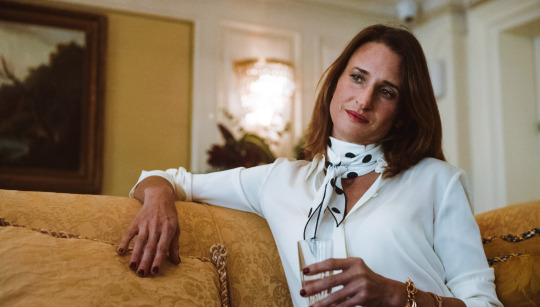
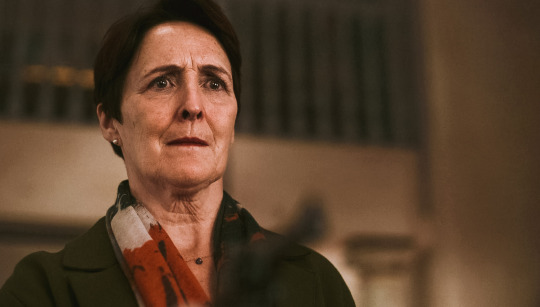
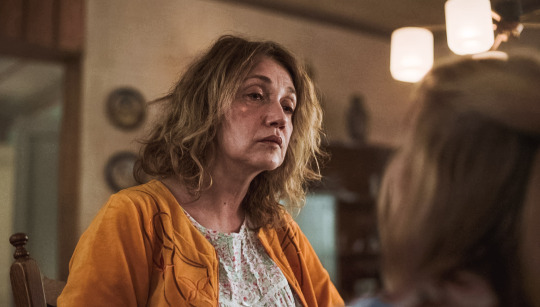
See the pattern here? It really builds power.
A dominant or powerful character will be shot from a low angle, forcing the viewer to look up at them. While on the other hand, characters that are in a position of inferiority are shot from a higher angle. It forces the viewer to literally look up at the dominant character and look down at the inferior one.
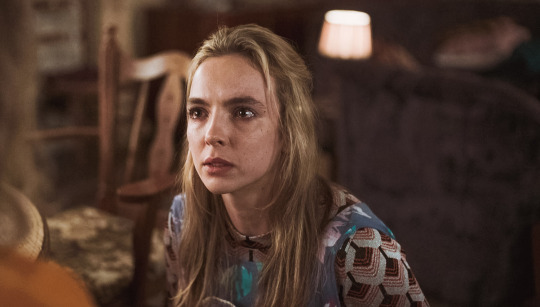
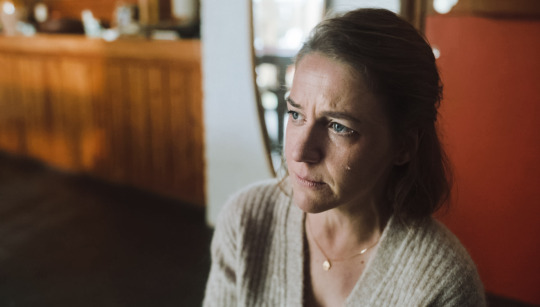
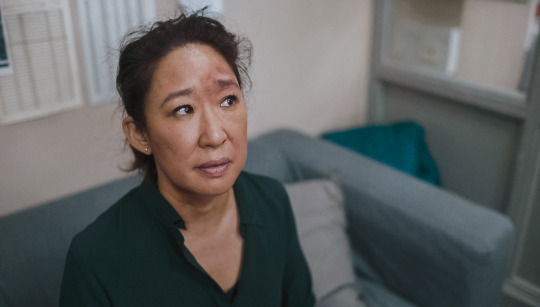
Now, this doesn’t mean that every character always gets the same camera angle, of course (except for hélène who gets the same type of angle 99% of the time, because well...she’s kind of the big boss, right?). It depends, once again, on the narrative of the scene.
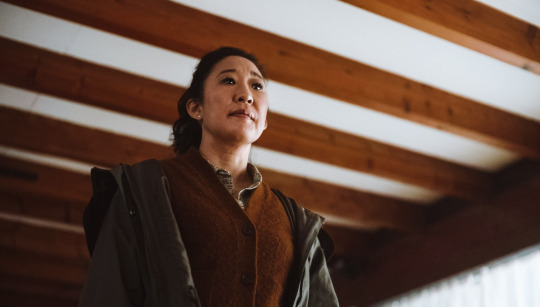
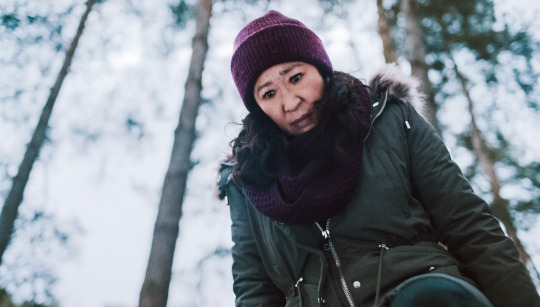
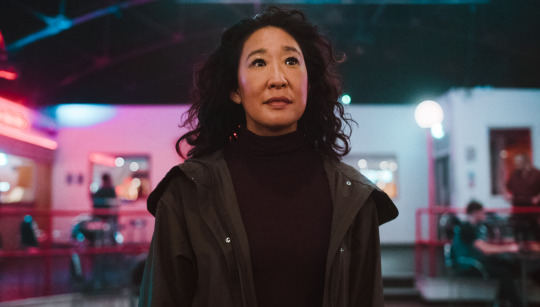
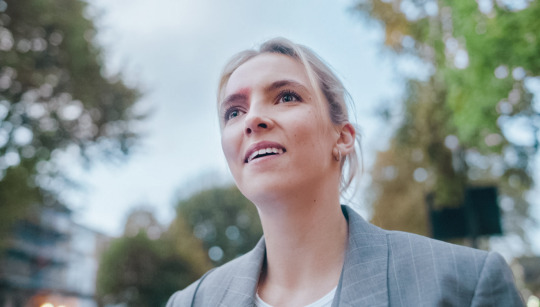
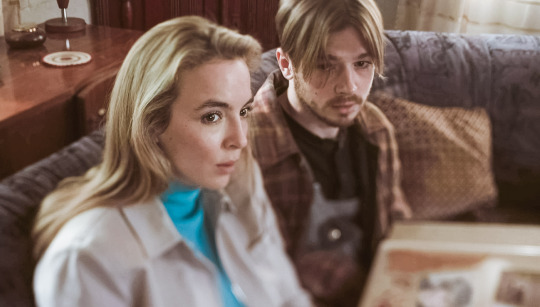

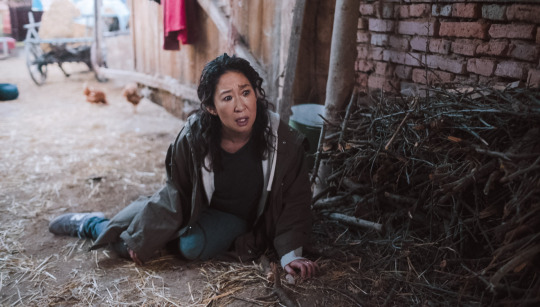
Let’s get into something even more interesting now...
Camera angles varies all the time, and as I said before, it goes along with what the scene is telling us. Let’s take an example from this one in episode 6:
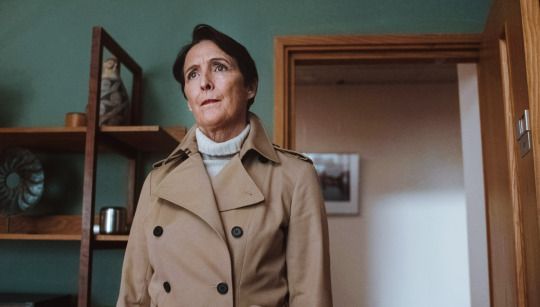
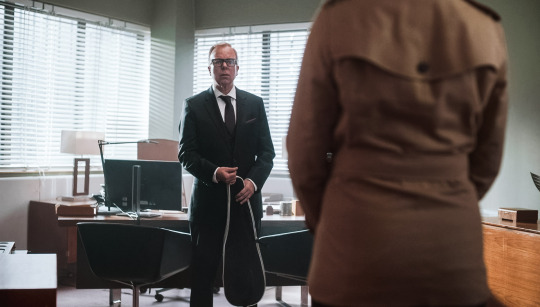
These characters start this point in the dialogue filmed from these camera angles. We have two very powerful and dominant characters face to face, but it’s Carolyn who starts asking first if he’s working for youknowwho, so, she gets the low angle first.
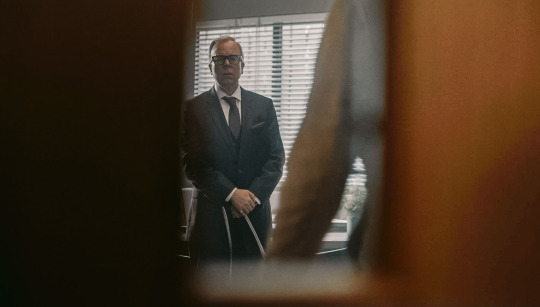
(I mean, he’s being literally framed thanks to this genius shot as the door closes)
Then a few seconds later...
“Are you, Carolyn?”
Low angle for Paul as well:
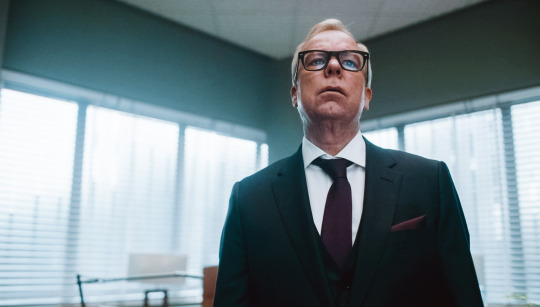
But then as we get this shot, the camera starts moving up and completely changes the angle for both characters.
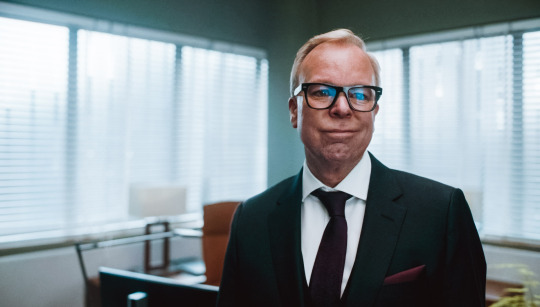
- Why on earth would you ask me that?
- Well, the same reason you asked me, because we don’t trust each other.
- Should I trust you?
- Heavens, no. None of us are to be trusted, that’s why we work here.
We got them in the same camera angle now.
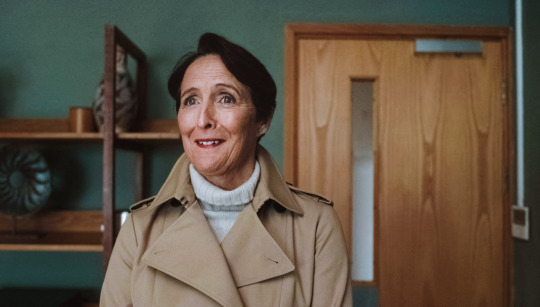
“The Dutch angle” (or “dutch tilt”)
This is one of the types of camera angles that most emotion can add to the screen. Commonly used in thrillers and horror scenes, it gives an obvious discomfort feeling, showing that something in the scene is off, portraying a sense of psychological trauma, emotion and tension. It can bring us into the mental state of the character in that moment.
The angle of the camera can be described as being horizontal to the bottom of the shot's frame. The horizon isn’t leveled and is off by at least 30º degrees or more:
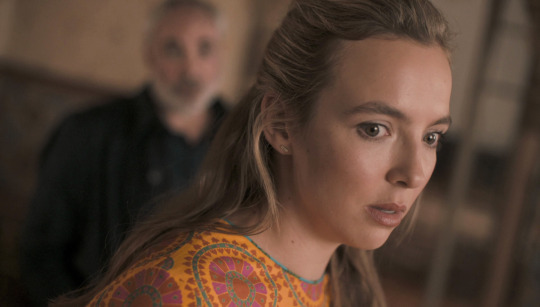
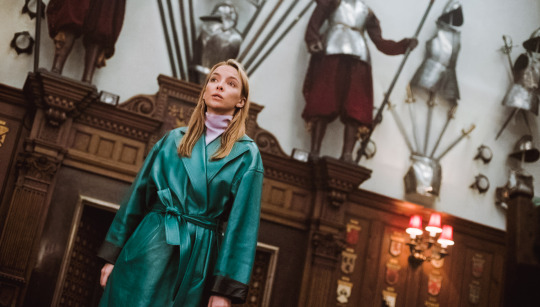
Overhead shots
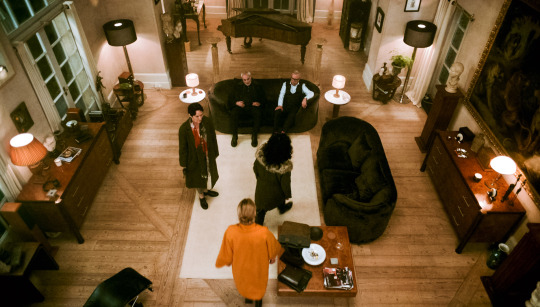
In this analysis we’ve seen different camera angles and how it conveys a certain feeling from the characters to the audience.
We’ve seen how if we film a character from above it can be seen as inferiority. So, what happens if we take this type of shot to the extreme?

Remember how Villanelle was feeling at this point in the series. We could say this was the lowest we’ve seen this character.
An overhead shot (or birds eye view) is when the camera is placed above the subject. This type of camera shots are a perfect technique to show that the character feels that it has no way out of the situation he/she is in. It isolates the character.
“I’ve got to get out of here” “I don’t want to do this anymore”
On a final note, I’d like to talk about a type of camera angle that we have seen multiple times this season:
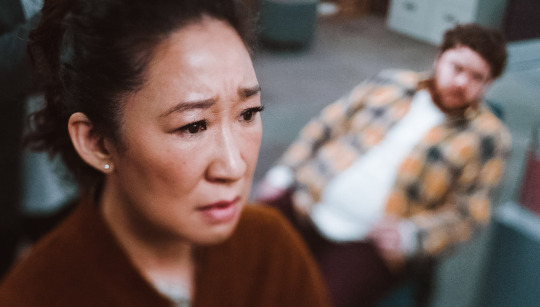
We’ve seen that filming a character from a high angle can make it seem vulnerable, inferior, making the audience understand that he/she is in a situation of distress. By also using a shallow depth of field (the distance between the nearest and furthest elements in a scene that appear to be “acceptably sharp” in an image) we intensify this feeling. As Killing Eve’s director of photography Tim Palmer said in a recent interview, this technique is used to metaforically get inside the brain of the character.
Remember the rule of thirds that I talked about in the previous post. If we place the subject where the air of the picture should be, it conveys a certain feeling of emotional disconnection or discomfort in a dialogue scene, right? In this camera shot all of this gets reinforced with this shallow depth of field:
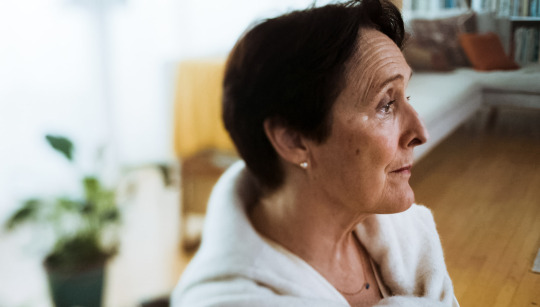
.
All original images belong to Killing Eve (BBC).
.
More photography analysis:
Rule of thirds
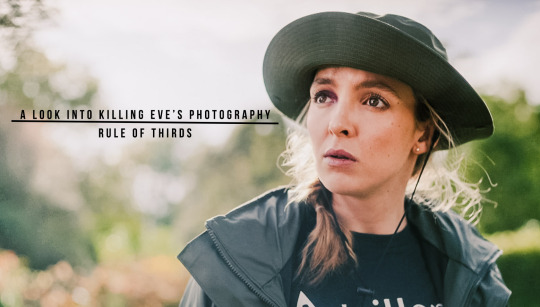
Leading lines
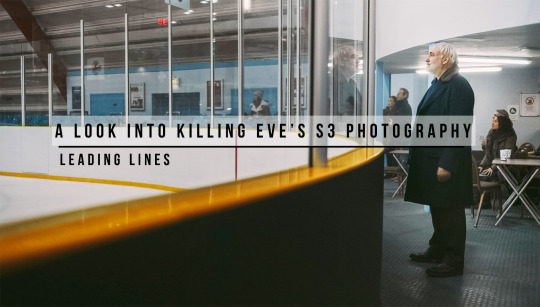
If you want to learn more about all of this:
Storytelling through all the filming elements: https://www.youtube.com/watch?v=aE-6M7IbNSI
Depth of field: https://www.photopills.com/articles/depth-of-field-guide
.
References:
https://wolfcrow.com/how-filmmakers-manipulate-our-emotions-using-camera-angles-and-movement/
#A look into Killing Eve’s S3 photography#let's learn photography with ke#killing eve photography#tv photography#killing eve cinematography#killing eve#ke#ke s3#villanelle#eve polastri#carolyn martens#konstantin#jodie comer#sandra oh#ke analysis#killing eve analysis#ke photography analysis
303 notes
·
View notes